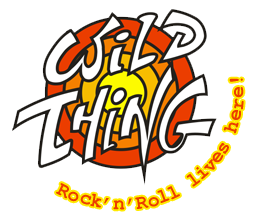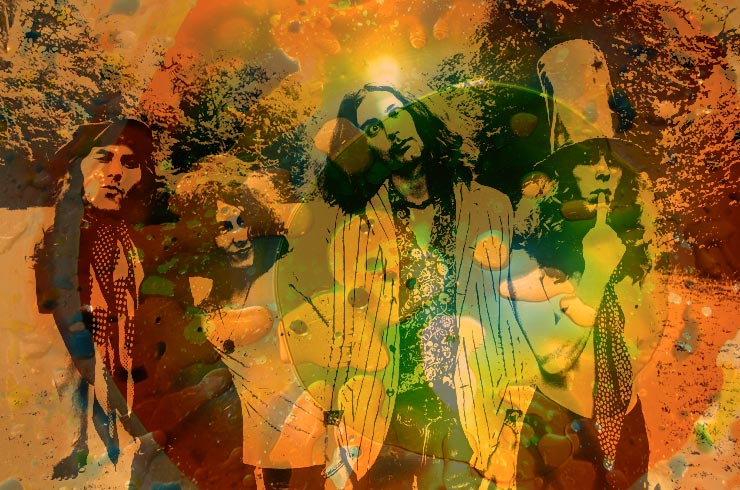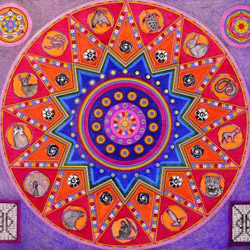
Ο John 'Twink' Alder στο Wild Thing
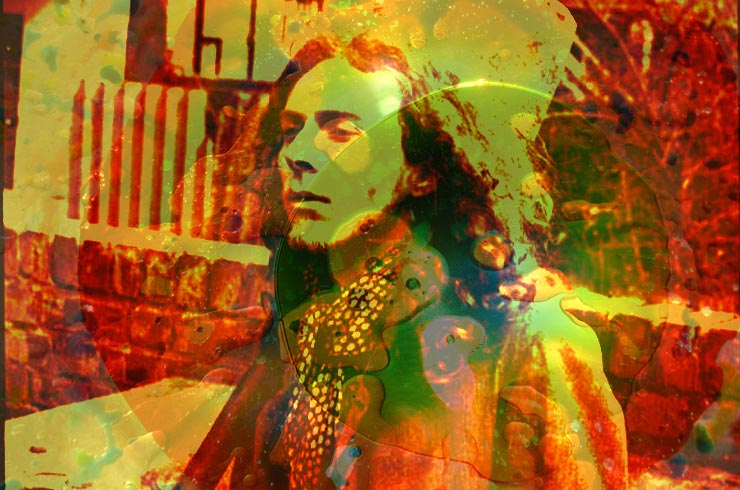
Ο John 'Twink' Alder είναι μία από τις σημαντικότερες και αυθεντικότερες μορφές στην ιστορία του βρετανικού ροκ και όχι μόνο. Ένας από τους καλύτερους και επιδραστικότερους ντράμερ των 60s και των 70s, μέλος σε θρυλικά συγκροτήματα όπως οι Fairies, οι Tomorrow, οι Santa Barbara Machine Head (με ονόματα όπως οι Jon Lord και Ron Wood), οι Pretty Things και οι Rings. Ιδρυτής των ιστορικότατων Pink Fairies και συνιδρυτής των βραχύβιων αλλά σημαντικότατων Stars με τους Syd Barrett και Jack Monck. Πάντα ανήσυχος και ανοιχτός μουσικά συνεργάστηκε και τζάμαρε με άπειρους μουσικούς και σχήματα (ενδεικτικά ας αναφέρουμε τους Jimi Hendrix, Hawkwind αλλά και μέλη των Sex Pistols). Εκτός από κεντρική φιγούρα της ψυχεδελικής σκηνής των 60s, ήταν επίσης παρών όταν το πανκ αναθεωρούσε τα ροκ δεδομένα, αφού εκτός των άλλων, απότελεσε έμπνευση για το κίνημα αυτό. Παράλληλα οι προσωπικές ηχογραφήσεις του, όπως το υπέροχο 'Think Pink' (1970) ή το άδικα παραγνωρισμένο 'Mr. Rainbow' (1990), στέκονται πάντα μέσα στα καλύτερα δείγματα του ροκ ιδιώματος. Πριν από έξι χρόνια περίπου, ο κύριος John Alder ασπάστηκε το Ισλάμ, άλλαξε το όνομα του σε Mohammed Abdullah και ζεί με την οικογένεια του στο Μαρόκο. Είναι μεγάλη τιμή για το Wild Thing που μας έδωσε τη συνέντευξη που ακολουθεί.
Wild Thing: Πότε ξεκίνησε το ενδιαφέρον σας για την μουσική και τι σας ώθησε στα ντραμς;
Mohammed Abdullah John Alder: Ενδιαφέρομαι για την μουσική από τότε που θυμάμαι τον εαυτό μου, δηλαδή γύρω στην ηλικία των πέντε ετών, αν και έχω κάποιες παλαιότερες αναμνήσεις που δεν αφορούν τη μουσική! Γύρω στα 13 μου έπαιζα κιθάρα σε ένα skiffle γκρουπ, τους Airliners, ώσπου μπήκε στην μπάντα ένας τύπος που έπαιζε καλύτερη κιθάρα από μένα. Του έδωσα την κιθάρα μου για να παίζει στο γκρουπ και εγώ άρχισα να παίζω washboard με τους Airliners, κάτι που με οδήγησε στα ντραμς. Μέσα στις αρχικές μου επιρροές ήταν οι δύο ντράμερ Gene Krupa και Eric Delaney.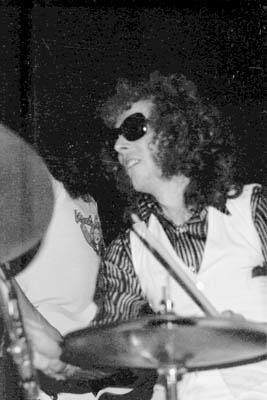 W.T.: Ποιες ήταν οι βασικές σας μουσικές επιρροές στα ντραμς αλλά και στην μουσική γενικότερα;
W.T.: Ποιες ήταν οι βασικές σας μουσικές επιρροές στα ντραμς αλλά και στην μουσική γενικότερα;
M.A.J.A.: Με ενδιέφεραν όλα τα είδη μουσικής και αφότου άρχισε η εξάπλωση του ροκ εν ρολ, αυτή ήταν η μουσική που ήθελα να παίζω. Ξεκίνησα όπως σας είπα, παίζοντας σε γκρουπ skiffle, που ήταν ένας φτηνός τρόπος για να μπεις στη μουσική. Στα 13 μου αγόρασα τα πρώτα ντραμς μου και έγινα μέλος των Planets. Οι επιρροές μας ήταν ο Gene Vincent, ο Eddie Cochran, ο Buddy Holly και ο Little Richard. Το συγκρότημα αυτό δεν κράτησε για πολύ, αλλά μετά έπαιξα στους Eddie Lee Cooper & The Trappers, που είχαν τις ίδιες επιρροές συν τον Jerry Lee Lewis.
W.T.: Πριν από τους Fairies παίζατε με κάποια γκρουπ;
M.A.J.A.: Skiffle μπάντες: The Airliners / The Angels / The Black Zillians. Rock μπάντες: The Planets / Eddie Lee Cooper & The Trappers / Jimmy Pilgrim & The Strangers. R&B μπάντες: Dane Stevens & The Deepbeats. Επίσης να σας πω τι όργανο έπαιζα σε κάθε γκρουπ:
The Airliners - washboard & δεύτερα φωνητικά. The Angels - ρυθμική κιθάρα & φωνή. The Black Zillians - ντραμς. The Planets - ντραμς. Eddie Lee Cooper & The Trappers - ντραμς και φωνή στο "Brand New Cadillac". Jimmy Pilgrim & The Strangers - ντραμς και φωνή στα "Shakin' All Over" & "Somewhere Over The Rainbow". Dane Stevens & The Deepbeats - ντραμς και φωνή στο "My Babe". The Fairies - ντραμς και φωνή στα "My Babe", "Hey Bo Diddley" & "I've Got Τo Get My Whiskey".
W.T.: Ποιοι ήταν οι λόγοι που η γενιά σας - μουσικοί και ακροατήριο - στην Βρετανία στράφηκε στην μαύρη μουσική;
M.A.J.A.: Μας τράβαγε η μαύρη μουσική όπως τα blues, folk blues, rhythm & blues, rock & blues κ.τ.λ. λόγω της ίδιας της μουσικής, των μηνυμάτων και ιστοριών που έλεγε. Εμείς οι μουσικοί αποφασίσαμε να μιμηθούμε τους μεγάλους καλλιτέχνες αυτών των σκηνών και να μεταφέρουμε το μήνυμα.
W.T.: Οι Fairies ήταν απ' τα καλύτερα βρετανικά r&b συγκροτήματα της περιόδου. Πείτε μας μερικά πράγματα γι' αυτούς.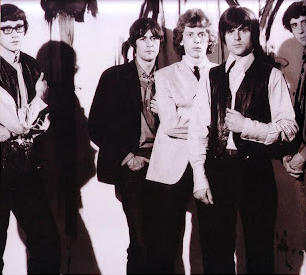 M.A.J.A.: Ο Dane Stevens & The Deepbeats ήταν πολύ γνωστοί στην περιοχή του Essex όταν μπήκα στη μπάντα τους. Τότε ήμουν 'mod' και άκουγα πολύ κουλ μουσική της mod σκηνής. Οι Deepbeats έπαιζαν ήδη r&b, με έναν σαξοφωνίστα και έναν lead κιθαρίστα που δεν γούσταραν και πολύ την συμμετοχή μου. Ο σαξοφωνίστας και ο κιθαρίστας έφυγαν. Ο κιθαρίστας αντικαταστάθηκε από τον ρυθμικό κιθαρίστα που έπαιζε μαζί μου στους Black Zillians, τους Eddie Lee Cooper & The Trappers και τους Jimmy Pilgrim & The Strangers. Τον έλεγαν John 'Akky' Acutt. Τα μέλη του γκρουπ τότε ήταν ο Dane Stevens - φωνητικά, ο Mick Weaver - πρώτη κιθάρα, ο John Accutt - ρυθμική κιθάρα, ο John Gandy - μπάσο κι εγώ στα ντραμς. Κερδίσαμε πολλή δημοτικότητα με την συνεισφορά των καινούργιων μελών που θέλανε μια πιο αυθεντική r&b μπάντα. Τελικά η Decca Records μας ανακάλυψε και αποφάσισε να μας ηχογραφήσει. Κάναμε πέντε κομμάτια στα στούντιο της Decca στο West Hampstead του Λονδίνου με παραγωγό τον Mike Leander. Αποφασίσαμε να αλλάξουμε το όνομα του γκρούπ και ένας φίλος μας πρότεινε το 'Fairies' το οποίο μας άρεσε. Οπότε γίναμε ένα fuzz r&b συγκρότημα, οι The Fairies! Η Decca κυκλοφόρησε το σινγκλ "Don't Think Twice It's Alright / Anytime At All". Αυτή η μοναδική κυκλοφορία μας μας έφερε να ζήσουμε στο Λονδινο και να κάνουμε πολλές συναυλίες. Αρχίσαμε να προβάρουμε ένα νέο σινγκλ με τον Micky Most όταν ο Dane Stevens μπλέχτηκε σε ένα σοβαρό τροχαίο με κάμποσους νεκρούς και πήγε φυλακή.
M.A.J.A.: Ο Dane Stevens & The Deepbeats ήταν πολύ γνωστοί στην περιοχή του Essex όταν μπήκα στη μπάντα τους. Τότε ήμουν 'mod' και άκουγα πολύ κουλ μουσική της mod σκηνής. Οι Deepbeats έπαιζαν ήδη r&b, με έναν σαξοφωνίστα και έναν lead κιθαρίστα που δεν γούσταραν και πολύ την συμμετοχή μου. Ο σαξοφωνίστας και ο κιθαρίστας έφυγαν. Ο κιθαρίστας αντικαταστάθηκε από τον ρυθμικό κιθαρίστα που έπαιζε μαζί μου στους Black Zillians, τους Eddie Lee Cooper & The Trappers και τους Jimmy Pilgrim & The Strangers. Τον έλεγαν John 'Akky' Acutt. Τα μέλη του γκρουπ τότε ήταν ο Dane Stevens - φωνητικά, ο Mick Weaver - πρώτη κιθάρα, ο John Accutt - ρυθμική κιθάρα, ο John Gandy - μπάσο κι εγώ στα ντραμς. Κερδίσαμε πολλή δημοτικότητα με την συνεισφορά των καινούργιων μελών που θέλανε μια πιο αυθεντική r&b μπάντα. Τελικά η Decca Records μας ανακάλυψε και αποφάσισε να μας ηχογραφήσει. Κάναμε πέντε κομμάτια στα στούντιο της Decca στο West Hampstead του Λονδίνου με παραγωγό τον Mike Leander. Αποφασίσαμε να αλλάξουμε το όνομα του γκρούπ και ένας φίλος μας πρότεινε το 'Fairies' το οποίο μας άρεσε. Οπότε γίναμε ένα fuzz r&b συγκρότημα, οι The Fairies! Η Decca κυκλοφόρησε το σινγκλ "Don't Think Twice It's Alright / Anytime At All". Αυτή η μοναδική κυκλοφορία μας μας έφερε να ζήσουμε στο Λονδινο και να κάνουμε πολλές συναυλίες. Αρχίσαμε να προβάρουμε ένα νέο σινγκλ με τον Micky Most όταν ο Dane Stevens μπλέχτηκε σε ένα σοβαρό τροχαίο με κάμποσους νεκρούς και πήγε φυλακή.
Όταν χάσαμε τον Dane, ο Nick Wymer από τους Nix Nomads τον αντικατέστησε. Ο Nick ήταν καλός αλλά οι Fairies έπεσαν στη «δεύτερη κατηγορία» και δυσκολεύονταν να επανέλθουν. Ηχογραφήσαμε δύο σινγκλ για την EMI, το "Get Yourself Home / Baby Don't" και το "Don't Mind / I'll Dance". Εμφανιστήκαμε στην τηλεοπτική εκπομπή Thank Your Lucky Stars και για τα δύο σινγκλ. Τα πράγματα όμως δεν πήγαν πολύ καλά με τον Nick και τελικά ο Dane Stevens γύρισε στο συγκρότημα μετά από ένα χρόνο φυλάκισης. Η μουσική σκηνή άλλαζε, οι Fairies όμως είχαν χάσει την ευκαιρία τους. Παρόλα αυτά συνεχίζαμε να το παλεύουμε. Ένα βράδυ που οι Fairies έπαιζαν στο Λονδίνο εμφανίστηκαν οι φίλοι μας από τους In Crowd, ο Steve Howe και ο Keith West, και μου πρότειναν να μπω στο συγκρότημά τους. Δέχτηκα και το ίδιο βράδυ άφησα τους Fairies για να ξεκινήσω με τους In Crowd την επόμενη μέρα. Οι Fairies συνέχισαν να παίζουν λίγο καιρό ακόμη με έναν καινούργιο ντράμερ, αλλά το όνειρο είχε τελειώσει και η μπάντα διαλύθηκε.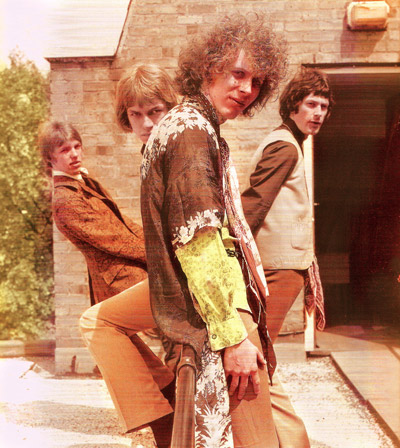 W.T.: Το ψευδώνυμο 'Twink' πώς προέκυψε;
W.T.: Το ψευδώνυμο 'Twink' πώς προέκυψε;
M.A.J.A.: Όταν οι Fairies άρχισαν να περιοδεύουν το 1964/65 πηγαίναμε συχνά στη Σκωτία και κερδίσαμε αρκετούς οπαδούς εκεί. Το σκωτζέζικο φαν κλαμπ μας έστελνε συχνά δώρα στα μέλη του γκρουπ στο διαμέρισμά μας, στο Paddington του Λονδίνου. Το δικό μου δώρο, εν είδει πλάκας, ήταν ένα προϊόν για περμανάντ, το Twink Home Perm, γιατί είχα πολύ κατσαρά μαλλιά και βέβαια δεν είχα κάνει ποτέ μου περμανάντ. Οι υπόλοιποι στο γκρουπ άρχισαν να με φωνάζουν Twink και τα υπόλοιπα είναι ιστορία.
W.T.: Το 1966 μπήκατε λοιπόν στους In Crowd οι οποίοι στην συνέχεια μετονομάστηκαν σε Tomorrow. Οι ήχοι και οι καταστάσεις άρχισαν να αλλάζουν στην βρετανική σκηνή. Τι έπαιξε ρόλο σε αυτό;
M.A.J.A.: Όταν μπήκα στους In Crowd ήταν μία μπάντα σόουλ, αλλά αυτό ήταν να αλλάξει. Η μουσική σκηνή άλλαζε παντού στον κόσμο, κυρίως λόγω της χρήσης ουσιών όπως το χασίς και τα ψυχεδελικά σαν το LSD, τη ψιλοκυβίνη κ.τ.λ. Νέα κλαμπ άνοιγαν, νέες μουσικές κυκλοφορούσαν, νέοι συγγραφείς έγραφαν σε περιοδικά και βιβλία, νέα λουκ και στυλ ντυσίματος. Εμείς, ως In Crowd, έπρεπε να μπούμε σ' αυτό για να επιβιώσουμε. Αλλάξαμε το όνομά μας σε Tomorrow, αλλάξαμε την εικόνα και το μουσικό μας στυλ. Η συνέχεια είναι γνωστή.
W.T.: Ήσασταν ενήμεροι για τα όσα συνέβαιναν την ίδια εποχή στο Σαν Φρανσίσκο; Παρακολουθούσατε την αμερικάνικη ψυχεδελική σκηνή; Ποιες ήταν κατά την γνώμη σας οι ομοιότητες και οι διαφορές των δύο σκηνών (Αμερική - Βρετανία);
M.A.J.A.: Τότε πίστευα ότι υπάρχει διαφορά μεταξύ της αμερικάνικης και της αγγλικής νέας σκηνής, αλλά κάνοντας τώρα μία αποτίμηση δεν υπήρχε καμμία διαφορά. Άκουγα πιο πολύ αμερικάνικη ψυχεδέλεια όπως οι Electric Prunes, οι Jefferson Airplane, οι Doors και οι Country Joe and The Fish. Από αγγλικά άκουγα τους Beatles, τους Rolling Stones, τους Yardbirds, τους Moody Blues (Days of Future Passed) και όσο πέρναγε ο καιρός όλο και περισσότερη ψυχεδελική μουσική και από τις ΗΠΑ και τη Βρετανία.
W.T.: Tο 1967 παράλληλα με τους Tomorrow συμμετείχατε στο σχήμα Santa Barbara Machine Head με τον πρόσφατα χαμένο Jon Lord, τον Kim Gardner και τον Ron Wood. Θέλετε να μας πείτε μερικά πράγματα για το σχήμα αυτό;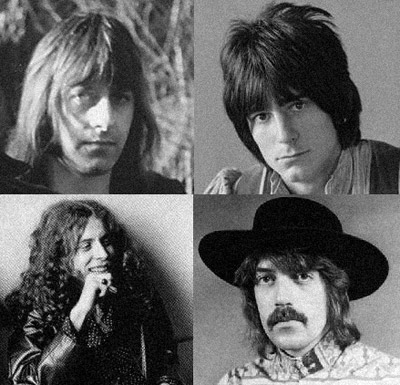 M.A.J.A.: Οι Santa Barbara Machine Head ήταν στην πραγματικότητα συγκρότημα του στούντιο, έμπνευση του Jon Lord. Συγκατοικούσα με τον Jon την εποχή που οι Tomorrow μόλις ξεκινούσαν. Μια μέρα προσκάλεσε τον Kim Gardner, τον Ron Wood και εμένα στο Decca Studios για να ηχογραφήσουμε μαζί του. Παραγωγός ήταν ο Gus Dudgeon και γράψαμε τρία κομμάτια τα: "Rubber Monkey", "Albert" και "Porcupine Juice". Παίξαμε μία φορά στα γρήγορα τα κομμάτια πριν τα γράψουμε, ήταν μόνο μία ηχογράφηση χωρίς πρόβες και μετά τέλος. Δεν ξέρω άμα ο Jon είχε - ίσως - υπ' όψη του να φτίαξει μαζί μας μια μπάντα, αλλά αυτό το σέσιον είχε πολύ πλάκα.
M.A.J.A.: Οι Santa Barbara Machine Head ήταν στην πραγματικότητα συγκρότημα του στούντιο, έμπνευση του Jon Lord. Συγκατοικούσα με τον Jon την εποχή που οι Tomorrow μόλις ξεκινούσαν. Μια μέρα προσκάλεσε τον Kim Gardner, τον Ron Wood και εμένα στο Decca Studios για να ηχογραφήσουμε μαζί του. Παραγωγός ήταν ο Gus Dudgeon και γράψαμε τρία κομμάτια τα: "Rubber Monkey", "Albert" και "Porcupine Juice". Παίξαμε μία φορά στα γρήγορα τα κομμάτια πριν τα γράψουμε, ήταν μόνο μία ηχογράφηση χωρίς πρόβες και μετά τέλος. Δεν ξέρω άμα ο Jon είχε - ίσως - υπ' όψη του να φτίαξει μαζί μας μια μπάντα, αλλά αυτό το σέσιον είχε πολύ πλάκα.
W.T.: Ο Joe Boyd στο βιβλίο του White Bicycles - Making Music in the 60s χαρακτηρίζει την εκτέλεση του κομματιού σας "Revolution" ένα βράδυ στο UFO Club ως την αποθέωση του βρετανικού αντεργκράουντ των 60s. Θέλετε να μας πείτε μερικά πράγματα για την ατμόσφαιρα στο UFO Club, σε συναυλίες όπως το 14th Hour Technicolour Dream αλλά και γενικότερα στο Λονδίνο τότε;
M.A.J.A.: Το 1966 και 1967 ήταν ιδιαίτερα συναρπαστικές χρονιές για τα κλαμπ του Λονδίνου και διάφορους άλλους μεγάλους συναυλιακούς χώρους και φεστιβάλ. Η μουσική άλλαζε και άλλαζαν και οι άνθρωποι.Το UFO Club του Λονδίνου ήταν η πρώτη μου εμπειρία της σκηνής, της απόλυτα ψυχεδελικής ατμόσφαιρας. Liquid lights, αρωματικά στικάκια, προβολές ταινιών στους τοίχους, ηθοποιοί να κάνουν μικρά θεατρικά, «χαμένος» ψυχεδελικός χορός κι οι Pink Floyd στη σκηνή. Από εκεί πήρανε ιδέες για το The 14 Hour Technicolor Dream στο Alexandra Palace, την ταινία Christmas On Earth και άλλα... Αν και οι πιο μεγάλες παραστάσεις ήταν φοβερά ενδιαφέρουσες, το UFO παίρνει το βραβείο ψυχεδελικής ατμόσφαιρας και φοβερής μουσικής.
W.T.: Είχατε πει ότι το κομμάτι "My White Bicycle" είχε ως έμπνευση το κίνημα των ολλανδών Provos. Ποια είναι η αποψή σας για τα εναλλακτικά κινήματα της τότε εποχής;
M.A.J.A.: Είναι αλήθεια ότι οι δραστηριότητες των ολλανδών Provos ήταν η έμπνευση για το τραγούδι "My White Bicycle", αλλά εκείνη την εποχή δεν είχαμε κάποια πραγματική επαφή με την αντεργκράουντ σκηνή στη Βρετανία ή την Ευρώπη πέραν του «μαύρου» που αγοράζαμε. Μόνο αφότου ξεκινήσαμε τις συναυλίες στο UFO, ήρθαμε σε επαφή με αυτή τη σκηνή και αρχίσαμε να εκτιμούμε το κίνημα αυτό. Το «ραντάρ» μου είχε πιάσει τους Deviants μέχρι το 1969 και τους MC5 μέχρι το 1970. Οι MC5 είναι ένα από τα μεγαλύτερα λάιβ συγκροτήματα που έχω δει ποτέ μου.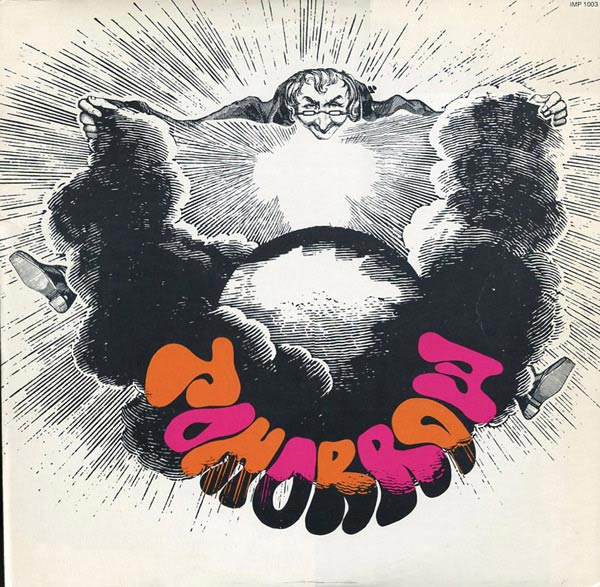 W.T.: Το άλμπουμ των Tomorrow είχε πάει πολύ καλά εμπορικά και οι συναυλίες σας είχαν μεγάλη απήχηση. Γιατί διαλύσατε;
W.T.: Το άλμπουμ των Tomorrow είχε πάει πολύ καλά εμπορικά και οι συναυλίες σας είχαν μεγάλη απήχηση. Γιατί διαλύσατε;
M.A.J.A.: Οι Tomorrow είχαν ήδη διαλυθεί όταν βγήκε το LP και οι συναυλίες μας ήταν πάντα πολύ συναρπαστικές και γεμάτες κόσμο. Ο λόγος για τη διάλυση του γκρουπ ήταν η επιτυχία του "Excerpt from a Teenage Opera" των Keith West / Mark Wirtz. Ο Keith βρέθηκε σε δύσκολη θέση και έκανε λάθος επιλογές...
W.T.: Μετά τους Tomorrow φτιάξατε τους Aquarian Age.
M.A.J.A.: Η φάση με τους Aquarian Age τελείωσε άδοξα γιατί μπαίνοντας στους Pretty Things ξεκινήσα μαζί τους τις συναυλίες, ενώ ο χρόνος μου αναλώθηκε στις ηχογραφήσεις για το S.F. Sorrow, το σάουντρακ του What's Good for the Goose, την ηχογράφηση με τον Phillipe Des Barges, και στην κινηματογραφική μου δουλειά με τον Norman Wisdom.
W.T.: Πώς μπήκατε στους Pretty Things;
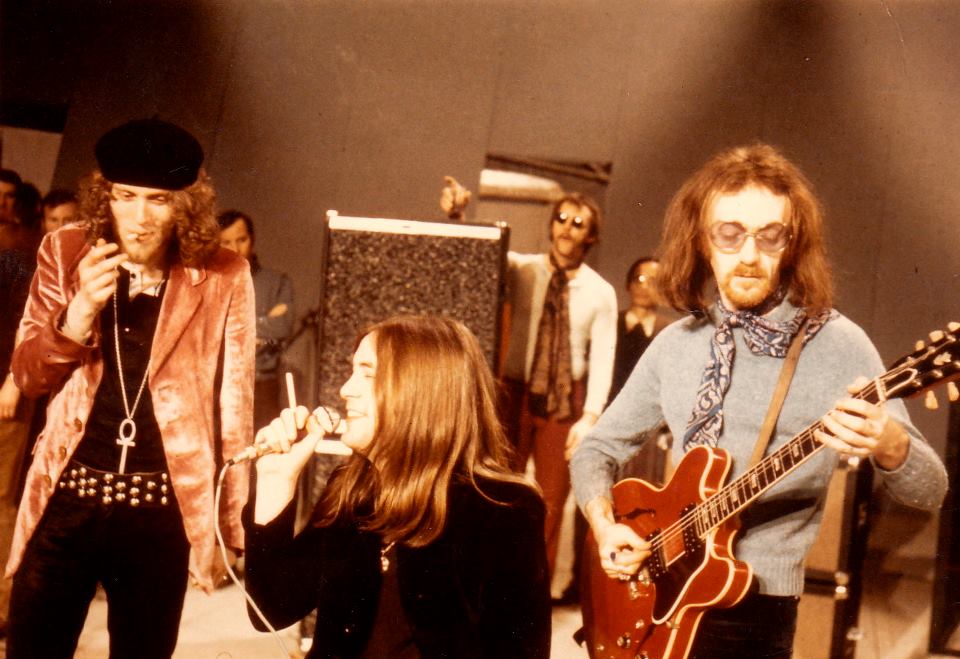 M.A.J.A.: Την εποχή που είχα το πρότζεκτ των Aquarian Age με πλησίασε ο Dick Taylor για να βοηθήσω τους Pretty Things, επειδή ο Skip (Allen) είχε φύγει, και ενώ η πρόθεσή μου ήταν να βοηθήσω για λίγο, κατέληξα να μείνω περίπου 18 μήνες στους Pretties. Οι Aquarian Age συνέχισαν για άλλους δύο μήνες αλλά η φάση «πάγωσε» γιατί με απασχολούσαν διάφορα σχέδια των Pretty Things, όπως η ηχογράφηση του S.F. Sorrow. Πραγματικά ευχαριστήθηκα τη δουλειά που έκανα πάνω στο S.F. Sorrow και χάρηκα που γύρισα στο στούντιο της Abbey Road, όπου είχα γράψει το άλμπουμ με τους Tomorrow και ένα σινγκλ με τους Aquarian Age. Μου έχει μείνει ιδιαίτερα αξέχαστη η συνεργασία μου με τον παραγωγό Norman Smith, τον οποίο βρήκα πολύ δημιουργικό και ανοιχτό σε νέες ιδέες. Επίσης και ο μηχανικός ήχου Peter Mew ήταν φοβερός συνεργάτης.
M.A.J.A.: Την εποχή που είχα το πρότζεκτ των Aquarian Age με πλησίασε ο Dick Taylor για να βοηθήσω τους Pretty Things, επειδή ο Skip (Allen) είχε φύγει, και ενώ η πρόθεσή μου ήταν να βοηθήσω για λίγο, κατέληξα να μείνω περίπου 18 μήνες στους Pretties. Οι Aquarian Age συνέχισαν για άλλους δύο μήνες αλλά η φάση «πάγωσε» γιατί με απασχολούσαν διάφορα σχέδια των Pretty Things, όπως η ηχογράφηση του S.F. Sorrow. Πραγματικά ευχαριστήθηκα τη δουλειά που έκανα πάνω στο S.F. Sorrow και χάρηκα που γύρισα στο στούντιο της Abbey Road, όπου είχα γράψει το άλμπουμ με τους Tomorrow και ένα σινγκλ με τους Aquarian Age. Μου έχει μείνει ιδιαίτερα αξέχαστη η συνεργασία μου με τον παραγωγό Norman Smith, τον οποίο βρήκα πολύ δημιουργικό και ανοιχτό σε νέες ιδέες. Επίσης και ο μηχανικός ήχου Peter Mew ήταν φοβερός συνεργάτης.
Ήταν συναρπαστικό γιά μένα να δουλεύω με τους Pretty Things, που γνώρισα πρώτα ως φαν του αρχικού σχήματος, μετά ως φίλος, καταλήγοντας να γίνω μέλος τους. Ήξερα ήδη πολύ καλά τον Dick και τον Phil (May), μετά γνώρισα τον Jon (Povey) και τον Wally (Waller) δουλεύοντας μαζί τους, και οι δύο είναι εξαιρετικά ταλαντούχοι μουσικοί. Όταν πρωτοάκουσα το "Bracelets οf Fingers" με ντραμς του Skip, έμεινα άφωνος. Η ηχογράφηση του μπάσου και των ντραμς για το "Balloon Burning" μου έχει μείνει αξέχαστη, ήταν μια πολύ δεμένη και έντονη ερμηνεία για τον Wally και εμένα.
W.T.: Για ποιούς λόγους αποχωρήσατε;
M.A.J.A.: Οι ιδέες μου για την μουσική και την κατεύθυνσή της εξελίσσονταν διαφορέτικα και ερχόταν σε σύγκρουση με αυτές των Pretties. Ενάντια στις φήμες, δεν υπήρξε ποτέ καποία βίαιη αντιπαράθεση με τους Pretty Things, ωστόσο με απολύσανε τελικά για συμπεριφορά μη αρμόζουσα σε ροκ σταρ, χα χα χα !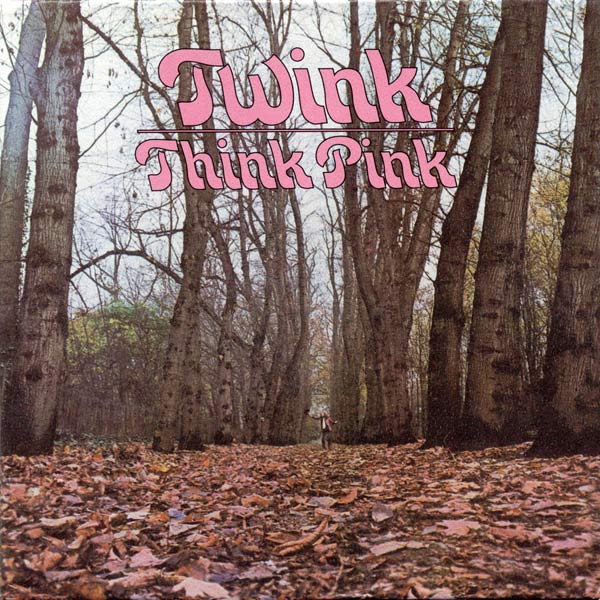 W.T: Aμέσως μετά ηχογραφήσατε το πρώτο σας σόλο άλμπουμ, το υπέροχο Think Pink.
W.T: Aμέσως μετά ηχογραφήσατε το πρώτο σας σόλο άλμπουμ, το υπέροχο Think Pink.
M.A.J.A.: 'Οπως είχα πει και παλαιότερα, ήμουν ακόμα με τους Pretty Things όταν ηχογράφησα το Think Pink, κάτι που δεν νομίζω να ευχαρίστησε τον Phil και τους μάνατζερ των Pretties. Είχε φοβερή πλάκα να ηχογραφώ παρέα με την βοήθεια των τότε κολλητών μου. Τα περισσότερα κομμάτια είχαν ήδη βγει σε διάφορα ντέμο. Το "Sparrow Ιs Α Sign" και το "3 Little Piggies" φτιάχτηκαν στο στούντιο. Το "Ten Thousand Words Ιn Α Cardboard Box" είχε ήδη κυκλοφορήσει από τους Aquarian Age. Άλλο ένα τραγούδι των Aquarian Age, το "Tiptoe on the Highest Hill" είχε ήδη ηχογραφηθεί σε ντέμο στα στούντιο της EMI στη Manchester Square στις αρχές του 1968. Το "Suicide", το πρώτο μου πραγματικό τραγούδι, που έγραψα το 1966, έγινε ντέμο εκείνη την εποχή στο στούντιο του σπιτιού μου. Οι ερμηνείες όλων ήταν έξοχες, ειδικά των Paul Rudolph, Jon Povey, John Wood και Steve Peregrine Took. Αξίζει να αναφέρω ότι το τελικό μιξάρισμα έγινε από τον Steve Peregrine Took και εμένα με την παρουσία του Richard Gottereh. Ο Richard ήταν ο συνέταιρος του Seymour Stein στη Sire Records.
W.T.: Πείτε μας για το υλικό του άλμπουμ The Lost Experimental Recordings 1970 που κυκλοφόρησε πολλά χρόνια αργότερα.
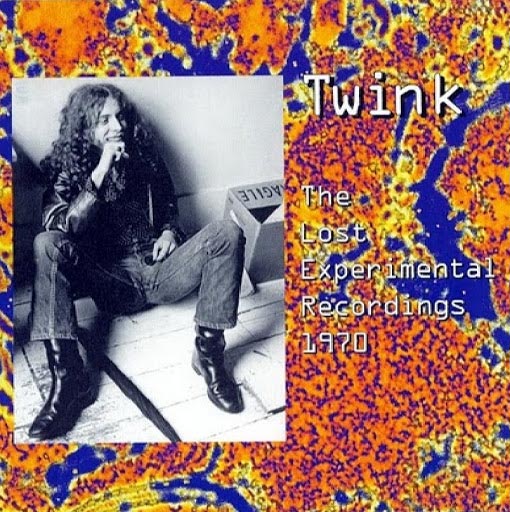 M.A.J.A.: Το The Lost Experimental Recordings του 1970 αποτελούσαν άτακτες ιδέες και σκετσάκια για μελλοντικές ηχογραφήσεις. Το "You Have Been Chosen" ήταν demo που γράφτηκε το 1968, όταν ζούσα στο Egerton Gardens του Knightsbridge. Oι ηχογραφήσεις με τη ονομασία "The Psychedelic Electrician" αποτελούσαν το σάουντρακ για το θεατρικό The Psychedelic Electrician, γραμμένο για έναν ηθοποιό, το οποίο δεν παίχτηκε ποτέ.
M.A.J.A.: Το The Lost Experimental Recordings του 1970 αποτελούσαν άτακτες ιδέες και σκετσάκια για μελλοντικές ηχογραφήσεις. Το "You Have Been Chosen" ήταν demo που γράφτηκε το 1968, όταν ζούσα στο Egerton Gardens του Knightsbridge. Oι ηχογραφήσεις με τη ονομασία "The Psychedelic Electrician" αποτελούσαν το σάουντρακ για το θεατρικό The Psychedelic Electrician, γραμμένο για έναν ηθοποιό, το οποίο δεν παίχτηκε ποτέ.
W.T.: Έχετε πει ότι ουσιαστικά το Think Pink είναι το πρώτο άλμπουμ των Pink Fairies. Οι Pink Fairies προέκυψαν από αυτό το άλμπουμ;
M.A.J.A.: Στο παρελθόν έχω πει ότι το Think Pink ήταν ο πρώτος δίσκος των Pink Fairies, αλλά σήμερα δεν το πιστεύω, μόνο μέχρι ένος σημείου. Το σίγουρο είναι ότι ο Steve Peregrine Took και εγώ, με τις Pink Fairy βελούδινες ζακέτες μας, είχαμε μια φαντασιακή μπάντα, τους Pink Fairies, που προωθούσαμε, η οποία όμως έγινε πραγματικότητα μόνον όταν εγώ άφησα τους Pretty Things και αυτός τους Tyrannosaurus Rex. Αφού έπαιξα ντραμς στους Carnivorous Circus έφτιαξα τους Pink Fairies με μέλη τους Paul Rudolph, Duncan Sanderson και Russell Hunter. Ζήτω το ροκ εν ρολ!
W.T.: Οι Pink Fairies ήταν απ' τα καλύτερα και επιδραστικότερα γκρουπ των αρχών της δεκαετίας του '70. Πείτε μας μερικά πράγματα για την φιλοσοφία του συγκροτήματος, το ιστορικό άλμπουμ Never Never Land και για το κομμάτι "Do It!";
M.A.J.A.: Σας παραθέτω ένα κείμενο από τις σημειώσεις του δίσκου Do It των Pink Fairies στην Bomp Records Total Energy Label (cd και βινύλιο). Συνοψίζει ξεκάθαρα το σκεπτικό/φιλοσοφία μας εκείνη την εποχή.
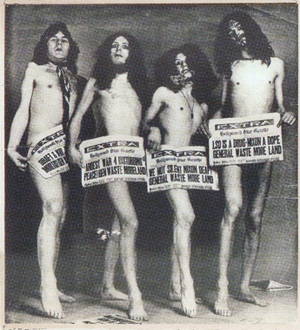 «Το 1969 ο κόσμος μου συνταράχτηκε από τη γνωριμία μου με αυτούς τους τύπους, τον Paul Rudolph, τον Duncan Sanderson και τον Russel Hunter, και για τα επόμενα δύο χρόνια νιώθαμε ότι θα κυριαρχήσουμε επί γης. Υψηλές προσδοκίες για μία τετράδα χίπηδων από το Ladbroke Grove. Να θυμάστε, ήταν η χαραυγή του stadium rock με την επιβολή τεράτων όπως οι Led Zeppelin. Η εποχή των θεών του ροκ, των παραφουσκωμένων εισιτηρίων και της απόλυτης απομόνωσης των μουσικών από τους ακροατές τους. Εμείς θέλαμε να τα γκρεμίσουμε όλα αυτά, κομμάτι - κομμάτι. Η σκέψη ότι οι φαν μας θα πληρώσουν να μας δούνε ήταν ακατανόητη. Παίζαμε μόνο τσάμπα, αφού το χρήμα είναι η ρίζα του κακού, έτσι δεν είναι; Σηκώσαμε δύο δάκτυλα στο εταιρικό ροκ στήνοντας τα μηχανήματά μας και παίζοντας έξω από τα τέραστια ροκ φεστιβάλ. Σαγηνεύσαμε το ακροατήριο από τις πύλες εισόδου των φεστιβάλ στο Isle of Wight και στο Bath. Γυμνοθήκαμε στο Phun City, παίζαμε σε συναυλίες αλληλεγγύης για τον αντεργκράουντ τύπο, ροκάραμε σε ένα συλλαλητήριο gay pride και βοηθήσαμε στο στήσιμο του πρώτου φεστιβάλ στο Glastonbury. Χωρίς ντροπή προωθούσαμε τους εαυτούς μας γράφοντας με σπρέι το όνομά μας στα πλαινά των υπεραστικών λεωφορείων. Επηρεάσαμε τους πάντες, από τους Hawkwind μέχρι τους Sex Pistols. Ήμασταν η μπάντα του λαού. Ζήτω το ροκ εν ρολ. -- Twink 1998.»
«Το 1969 ο κόσμος μου συνταράχτηκε από τη γνωριμία μου με αυτούς τους τύπους, τον Paul Rudolph, τον Duncan Sanderson και τον Russel Hunter, και για τα επόμενα δύο χρόνια νιώθαμε ότι θα κυριαρχήσουμε επί γης. Υψηλές προσδοκίες για μία τετράδα χίπηδων από το Ladbroke Grove. Να θυμάστε, ήταν η χαραυγή του stadium rock με την επιβολή τεράτων όπως οι Led Zeppelin. Η εποχή των θεών του ροκ, των παραφουσκωμένων εισιτηρίων και της απόλυτης απομόνωσης των μουσικών από τους ακροατές τους. Εμείς θέλαμε να τα γκρεμίσουμε όλα αυτά, κομμάτι - κομμάτι. Η σκέψη ότι οι φαν μας θα πληρώσουν να μας δούνε ήταν ακατανόητη. Παίζαμε μόνο τσάμπα, αφού το χρήμα είναι η ρίζα του κακού, έτσι δεν είναι; Σηκώσαμε δύο δάκτυλα στο εταιρικό ροκ στήνοντας τα μηχανήματά μας και παίζοντας έξω από τα τέραστια ροκ φεστιβάλ. Σαγηνεύσαμε το ακροατήριο από τις πύλες εισόδου των φεστιβάλ στο Isle of Wight και στο Bath. Γυμνοθήκαμε στο Phun City, παίζαμε σε συναυλίες αλληλεγγύης για τον αντεργκράουντ τύπο, ροκάραμε σε ένα συλλαλητήριο gay pride και βοηθήσαμε στο στήσιμο του πρώτου φεστιβάλ στο Glastonbury. Χωρίς ντροπή προωθούσαμε τους εαυτούς μας γράφοντας με σπρέι το όνομά μας στα πλαινά των υπεραστικών λεωφορείων. Επηρεάσαμε τους πάντες, από τους Hawkwind μέχρι τους Sex Pistols. Ήμασταν η μπάντα του λαού. Ζήτω το ροκ εν ρολ. -- Twink 1998.»
Το τραγούδι "Do It" γράφτηκε στο δρόμο για το στούντιο, αφού είχα μόλις λάβει ένα γράμμα από την BAG Productions που έλεγε ότι οι John & Yoko ήταν πολύ απασχολημένοι για να γράψουν ένα κομμάτι για τους Pink Fairies. Τους στίχους τους έγραψα σε λιγότερο από πέντε λεπτά. Η μουσική επίσης μου ήρθε εύκολα και όταν έφτασα στο στούντιο εξήγησα στον Paul «πάει έτσι... και έτσι...» μιμούμενος τραγουδιστά τους ήχους της κιθάρας, τους οποίους αυτός μετέφερε στην κιθάρα.
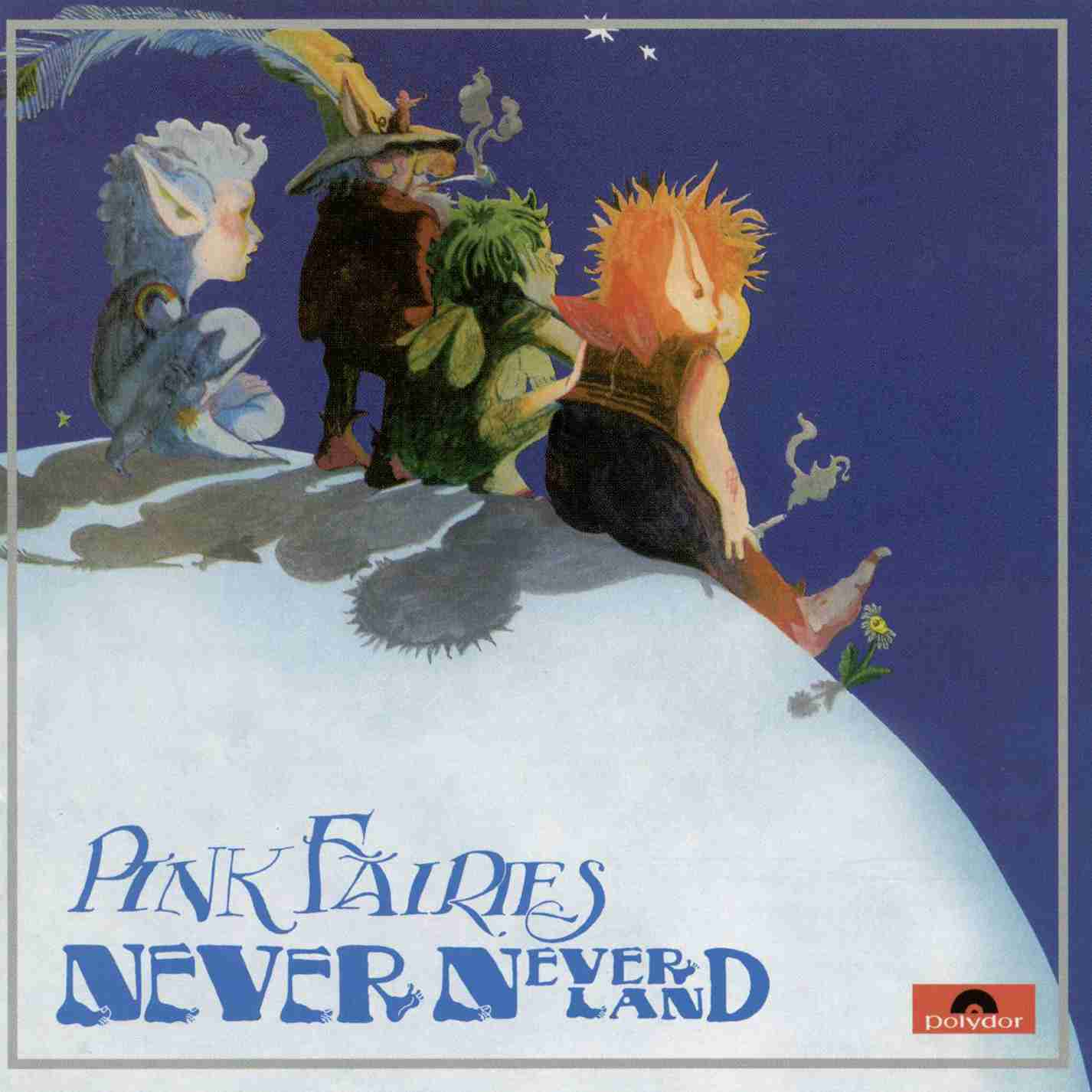 Το άλμπουμ Never Never Land των Pink Fairies κρύβει πολλά μυστικά, από το εξώφυλλο μέχρι και την κεντρική ιδέα του, και Θεού θέλοντος κάποια μέρα θα αποκαλυφτούν όλα! Είχε πλάκα να ηχογραφούμε σε ένα ολοκαίνουργιο στούντιο στο Piccadilly του Λονδίνου. Αρχικά δυσκολευτήκαμε με έναν παραγωγό που μας ανέθεσε η Polydor, τον Neil Slaven, αλλά τελικά πήραμε την παραγωγή στα χέρια μας και τελειώσαμε τον δίσκο. Προσπαθήσαμε να τιγκάρουμε όσα περισσότερα κομμάτια μπορούσαμε στο άλμπουμ, αλλά το παρακάναμε, πράγμα που μείωσε το εύρος των αυλακώσεων του δίσκου, με αποτέλεσμα να πρέπει να ανεβάσεις πολύ την ένταση για να το ακούσεις δυνατά. Η ιδέα και ο σχεδιασμός του εξώφυλλου ήταν δικά μου, εγώ καθοδηγούσα τη ζωγράφο Pennie Smith. Το τελικό της έργο ήταν φοβερό! Το αγαπημένο μου κομμάτι στο Never Never Land είναι το "Wargirl" - μουσική των Sanderson, Hunter και Rudolph και στίχοι του John 'Twink' Alder.
Το άλμπουμ Never Never Land των Pink Fairies κρύβει πολλά μυστικά, από το εξώφυλλο μέχρι και την κεντρική ιδέα του, και Θεού θέλοντος κάποια μέρα θα αποκαλυφτούν όλα! Είχε πλάκα να ηχογραφούμε σε ένα ολοκαίνουργιο στούντιο στο Piccadilly του Λονδίνου. Αρχικά δυσκολευτήκαμε με έναν παραγωγό που μας ανέθεσε η Polydor, τον Neil Slaven, αλλά τελικά πήραμε την παραγωγή στα χέρια μας και τελειώσαμε τον δίσκο. Προσπαθήσαμε να τιγκάρουμε όσα περισσότερα κομμάτια μπορούσαμε στο άλμπουμ, αλλά το παρακάναμε, πράγμα που μείωσε το εύρος των αυλακώσεων του δίσκου, με αποτέλεσμα να πρέπει να ανεβάσεις πολύ την ένταση για να το ακούσεις δυνατά. Η ιδέα και ο σχεδιασμός του εξώφυλλου ήταν δικά μου, εγώ καθοδηγούσα τη ζωγράφο Pennie Smith. Το τελικό της έργο ήταν φοβερό! Το αγαπημένο μου κομμάτι στο Never Never Land είναι το "Wargirl" - μουσική των Sanderson, Hunter και Rudolph και στίχοι του John 'Twink' Alder.
W.T.: Γιατί φύγατε από τους Pink Fairies;
M.A.J.A.: Έφυγα από τους Pink Fairies γιατί έπασχα από «παρανοϊκή σχιζοφρένια» και ενώ ήμουν πολύ άρρωστος, δεν το είχα καταλάβει. Μου πήρε πολλά χρόνια να συνέλθω, αλλά δόξα τω Θεώ τώρα είμαι καλά.
W.T.: Στα τέλη ης δεκαετίας του εξήντα η ροκ σκηνή έκανε μια στροφή από τις ψυχεδελικές ουσίες στα σκληρά ναρκωτικά. Τι επιπτώσεις είχε κατά την αποψή σας αυτή η στροφή πάνω στη μουσική;
M.A.J.A.: Το λυπητερό στην στροφή προς τα σκληρά ναρκωτικά ήταν ότι χάσαμε κάποιους φοβερούς μουσικούς και άλλαξε όλη η φάση, ειδικά στη Βρετανία. Εκείνη την εποχή, το 1967, εγώ προσωπικά πίστευα ότι μπορούσαμε να αλλάξουμε τον κόσμο προς το καλύτερο μέσω των μηνυμάτων της ψυχεδελικής μουσικής και του χίπικου κινήματος. Τα σκληρά ναρκωτικά, όπως το αλκοόλ, το σμακ, το σπιντ, η κοκαίνη κ.τ.λ. είναι εγωιστικά ναρκωτικά. Τα ψυχεδελικά, η «φούντα» και το χασίς είναι συμμετοχικές ουσίες. Η μουσική επηρεάστηκε και έγινε πιο σκληρή, αν και ορισμένοι δεν έχασαν τη πίστη τους και συνέχισαν να βγάζουν εκπληκτικούς δίσκους και σήμερα βλέπουμε μία τεράστια αναβίωση και ενδιαφέρον για τη Χρυσή Εποχή της μουσικής.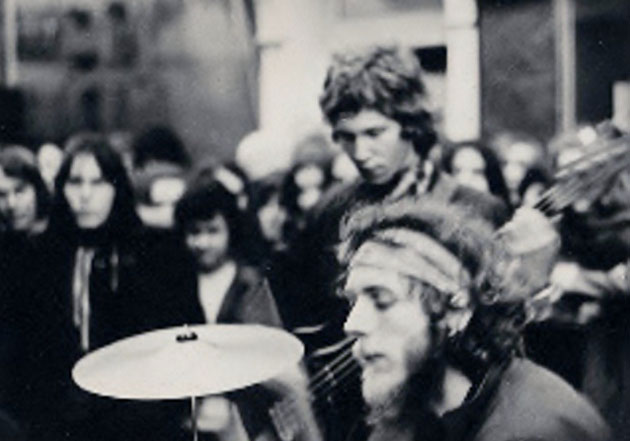 W.T.: Το 1972 φτιάξατε με τον Syd Barrett και τον Jack Monck τους Stars. Πώς προέκυψε αυτό το σχήμα; Υπάρχει κάποια ηχογράφηση;
W.T.: Το 1972 φτιάξατε με τον Syd Barrett και τον Jack Monck τους Stars. Πώς προέκυψε αυτό το σχήμα; Υπάρχει κάποια ηχογράφηση;
M.A.J.A.: Το 1972 έφτιαξα τους Stars με τον Syd Barrett και τον Jack Monck. Τον Syd, τον ήξερα από το 1967 όταν παίζαμε πολλές βραδιές στα ίδια μέρη, το Alexandra Palace, το Saville Theatre, το Roundhouse και άλλα, αλλά δεν γίναμε φίλοι μέχρι να φτιαχτούν οι Stars. Ήταν πραγματική ευχαρίστηση να δουλεύω με τον Syd στους Stars, η ατμόσφαιρα ήταν πολύ χαλαρή και χωρίς καμμία πίεση από κανέναν. Κάναμε πρόβες στο υπόγειο του Syd και στο πίσω δωμάτιο του What's In A Name, μία μπουτίκ στην Union Road του Καίμπριτζ. Υπάρχει μία ηχογράφηση των Stars στο YouTube με την λανθασμένη προσωνυμία 'Barrett, Gilmour & Shirley 1970', ενώ θα έπρεπε να είναι 'Stars, Barrett, Alder, Monck 1972'. Απ' όσο ξέρω αυτή είναι η μόνη ηχογράφηση Stars που διασώζεται.
W.T.: Γιατί διαλύθηκαν οι Stars?
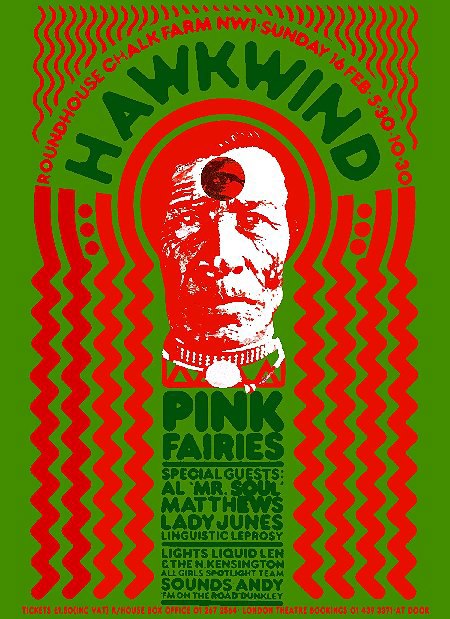 M.A.J.A.: Η πρώτη συναυλία στο Cambridge Corn Exchange έβριθε προβλημάτων. Το σύστημα ήχου ήταν ελαττωματικό και δεν υπήρχε υποστήριξη ήχου (backline). Ο Syd έκοψε το δάχτυλό του την ώρα που έπαιζε και αυτό έκανε το παίξιμό του πιο αργό. Οι roadies ήταν άπειροι και δεν μπορούσαν να αντιμετωπίσουν τα προβλήματα που παρουσιάζονταν. Μία ανεπαρκής συναυλία για τους Stars και για το κοινό. Μερικές μέρες αργότερα κάναμε μία δεύτερη συναυλία στο Cambridge Corn Exchange που πήγε γενικά καλύτερα. Δυστυχώς η πρώτη συναυλία έλαβε πολύ αρνητικές κριτικές σε ένα δημοφιλές μουσικό περιοδικό. Την επομένη της δημοσίευσης ο Syd πέρασε από το σπίτι μου στην Union Road και είπε ότι δεν θα ξαναπαίξει. Απογοητεύτηκα γιατί οι Stars ήταν καλό συγκρότημα.
M.A.J.A.: Η πρώτη συναυλία στο Cambridge Corn Exchange έβριθε προβλημάτων. Το σύστημα ήχου ήταν ελαττωματικό και δεν υπήρχε υποστήριξη ήχου (backline). Ο Syd έκοψε το δάχτυλό του την ώρα που έπαιζε και αυτό έκανε το παίξιμό του πιο αργό. Οι roadies ήταν άπειροι και δεν μπορούσαν να αντιμετωπίσουν τα προβλήματα που παρουσιάζονταν. Μία ανεπαρκής συναυλία για τους Stars και για το κοινό. Μερικές μέρες αργότερα κάναμε μία δεύτερη συναυλία στο Cambridge Corn Exchange που πήγε γενικά καλύτερα. Δυστυχώς η πρώτη συναυλία έλαβε πολύ αρνητικές κριτικές σε ένα δημοφιλές μουσικό περιοδικό. Την επομένη της δημοσίευσης ο Syd πέρασε από το σπίτι μου στην Union Road και είπε ότι δεν θα ξαναπαίξει. Απογοητεύτηκα γιατί οι Stars ήταν καλό συγκρότημα.
W.T.: Μετά τους Stars παίξατε για κάποιο διάστημα με τους Hawkwind. Πείτε μας γι' αυτό αλλά και για τα θρυλικά τζαμαρίσματα των Pink Fairies με τους Hawkwind.
M.A.J.A.: Όταν ζούσα στο Καίμπριτζ, αφού έφυγα από τους Pink Fairies, με πήρανε κάμποσα τηλέφωνα από τους Hawkwind ζητώντας μου να τους βοηθήσω επειδή ο Terry Ollis δεν ήτανε καλά. Έτσι έγινε και έκανα κάποιες ηχογραφήσεις μαζί τους, για παράδειγμα κάνω δεύτερα φωνητικά στο χιτ σινγκλ τους "Silver Machine", παίζω ντραμς στο Live At The Kenetic Playground και κρουστά στις πρώτες ηχογραφήσεις του Captain Lockheed & The Starfighters. Το Pinkwind ξεκίνησε σαν φάση κοινής προώθησης και εξελίχτηκε σε φευγάτα τζαμαρίσματα στο τέλος των συναυλιών μας. Η φάση 'Pinkwind' έγινε κανονική μπάντα στα 90s, με σταθερά μέλη πάντα τον Nik Turner και εμένα, και κυκλοφόρησε δύο άλμπουμ σε περιορισμένο αριθμό αντίτυπων, το Festival Of The Sun και το Purple Haze. Μπορεί να γίνουν συναυλίες Pinkwind και μέσα στο 2013.
W.T.: Το 1977 κάνατε φωνητικά και ηχογραφήσατε με τους Rings. Τι ήταν για σας το πανκ κίνημα; Ποια είναι η αποψή σας γι' αυτό κοινωνικά και μουσικά;
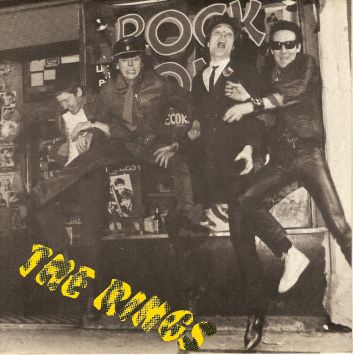 M.A.J.A.: Η εμφάνιση του πάνκ ροκ στη βρετανική σκηνή με ενθουσίασε. Ήταν καλό να βλέπεις τους μικρότερους να αρπάζουν στα χέρια τους και να οικιοποιούνται το ροκ εν ρολ. Η σκηνή στη Βρετανία είχε βαλτώσει, με τους κορυφαίους μας μουσικούς να την έχουν κάνει για την Αμερική, βγάζοντας λεφτά με τη σέσουλα και ζώντας εκεί. Το 1977 βγήκε ο δίσκος The Rings Live At The Club 100 στην Whiplash Records, ενώ την ίδια εποχή έκανα παρέα με τους Sex Pistols, The Damned, Johnny Thunders & The Heartbreakers, Chryssie Hynde, που ήταν όλοι τους μεγάλοι φαν των Pink Fairies.
M.A.J.A.: Η εμφάνιση του πάνκ ροκ στη βρετανική σκηνή με ενθουσίασε. Ήταν καλό να βλέπεις τους μικρότερους να αρπάζουν στα χέρια τους και να οικιοποιούνται το ροκ εν ρολ. Η σκηνή στη Βρετανία είχε βαλτώσει, με τους κορυφαίους μας μουσικούς να την έχουν κάνει για την Αμερική, βγάζοντας λεφτά με τη σέσουλα και ζώντας εκεί. Το 1977 βγήκε ο δίσκος The Rings Live At The Club 100 στην Whiplash Records, ενώ την ίδια εποχή έκανα παρέα με τους Sex Pistols, The Damned, Johnny Thunders & The Heartbreakers, Chryssie Hynde, που ήταν όλοι τους μεγάλοι φαν των Pink Fairies.
W.T.: Επίσης την επόμενη χρονιά κυκλοφόρησατε το EP Do it '77. Πείτε μας μερικά πράγματα γι' αυτή την κυκλοφορία και για την φάση "Acid Punk".
M.A.J.A.: Όταν τελικά διαλύθηκαν οι Rings, μετά το φεστιβάλ του Mont De Marson, η Chiswick Records μου πρότεινε να κάνω άλλο ένα σινγκλ. Αρχικά το τραγούδι που έγραψα λεγόταν "Acid Punk" - ο τίτλος προερχόταν από το φανζίν 'The Rings' του Alan Lee Shaw. Αν και το "Acid Punk" ήταν φοβερός τίτλος, δεν πήγαινε με το κομμάτι, οπότε το άλλαξα και έγινε "The Psychedelic Punkeroo". Το κομμάτι ακουγόταν άψογο από την πρώτη πρόβα με την πλήρη μπάντα, τον Steve Jones στην κιθάρα, τον Paul Cook στα ντραμς, τον Kid Rogers στο μπάσο και εμένα στα φωνητικά, στο στούντιο ηχογραφήσεων The Professionals. Εκεί ηχογράφησα τα "Psychedelic Punkeroo" και "Enter the Diamonds". Κατά τη διάρκεια της τελευταίας ηχογράφησης οι The Lightning Raiders επισκέφτηκαν το στούντιο και τζαμάραμε σε ένα take του "Do It", με τον Little John Hodge στην πρώτη κιθάρα, τον Duncan Sanderson στο μπάσο, τον Kid Rogers στην ρυθμική κιθάρα και εμένα στη φωνή και τα ντραμς. Η Chiswick Records ενθουσιάστηκε με το "Do It" και αποφάσισαν να το βγάλουν σε δωδεκάιντσο σινγκλ με τον τίτλο Do It '77. Κυκλοφόρησε με το όνομα Twink & The Fairies στις αρχές του 1978, αλλά ηχογραφήθηκε το 1977.
W.T.: Πώς αποφασίσατε να φτιάξετε την δισκογραφική εταιρεία Twink Records;
M.A.J.A.: Μετά από την επιτυχία του Do It '77 αποφάσισα να κάνω ένα διάλειμμα και μετακόμισα στις Βρυξέλλες, στο Βέλγιο με την γυναίκα μου Marie, που είναι από εκεί, και τον δίχρονο τότε γιο μου Frederick. Όσο ήμουν εκεί έπαιξα ντραμς στο άλμπουμ Victim Of Time του Elton Motello. Έκατσα στο Βέλγιο περίπου πέντε χρόνια και μετά επέστρεψα στη Βρετανία, στο Swindon του Wiltshire, όπου έγινα μέλος της μπάντας This World που μετονομάστηκαν σε Jazz. Κάναμε μερικές συναυλίες, μεταξύ άλλων στο Dingwalls του Λονδίνου, αλλά τους άφησα όταν γύρισα στην ιδιαίτερη πατρίδα μου, το Colchester στο Essex. Εκεί στο Colchester αποφάσισα να ξεκινήσω τη δική μου δισκογραφική, την Twink Records, πράγμα πολύ δύσκολο αρχικά λόγω έλλειψης χρημάτων. Η ιδέα μου ήταν να προμοτάρω τον John 'Twink' Alder ως μουσικό και να βοηθήσω και κάποιους νέους μουσικούς. Αρχικά συνάντησα μεγάλες δυσκολίες με τους διανομείς κατά την κυκλοφορία του επτάιντσου σινγκλ "Apocalipstic", του δωδεκάιντσου σινγκλ "Space Lover", και του άλμπουμ Mr. Rainbow σε LP και CD, οπότε αγόρασα ένα κόκκινο βαν και έγινα και 'TWK Distribution'! Εκεί είναι που άρχισε να δένει το πράγμα.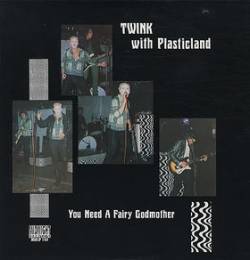 W.T.: Στα τέλη της δεκαετίας του '80 συμμετείχατε στο λάιβ άλμπουμ των Plasticland You Need A Fairy Godmother. Πώς βρεθήκατε μαζί τους; Ποια η άποψη σας για τη σκηνή της ψυχεδελικής αναβίωσης στα 80s;
W.T.: Στα τέλη της δεκαετίας του '80 συμμετείχατε στο λάιβ άλμπουμ των Plasticland You Need A Fairy Godmother. Πώς βρεθήκατε μαζί τους; Ποια η άποψη σας για τη σκηνή της ψυχεδελικής αναβίωσης στα 80s;
M.A.J.A.: Το 1987 συμμετείχα σε μία τουρνέ επανένωσης των Pink Fairies. Στο φεστιβάλ Acid Daze στο Finsbury Park παραβρέθηκε ο John Frankovic των Plasticland, ο οποίος με προσκάλεσε να συνεργαστούμε σε κάποιο πρότζεκτ τους. Μέσα στους επόμενους μήνες οργανώσαμε κάποιες συναυλίες στις ΗΠΑ και δύο ηχογραφήσεις. Από εκεί προέκυψαν ένα λάιβ άλμπουμ για την Midnight Records, το You Need A Fairy Godmother, και ένα σίνγκλ για μία γερμανική δισκογραφική, που δεν κυκλοφόρησε ποτέ. Η αναβίωση της ψυχεδελικής μουσικής, που ξεκίνησε στα 80s και συνεχίζει και σήμερα να παίρνει όλο και μεγαλύτερες διαστάσεις, με κατέπληξε.
W.T.: Το 1990 βγάλατε σε συνεργασία με τους Bevis Frond το άλμπουμ Magic Eye, ένα από τα καλύτερα εκείνης της χρονιάς.
M.A.J.A.: Το 1990 κυκλοφόρησε το Magic Eye ως Bevis & Twink. Ο 'Bevis' και εγώ χρησιμοποιήσαμε το ίδιο στούντιο όπου είχα ηχογραφήσει παλαιότερα το Mr. Rainbow και κάποια κομμάτια στο Odds & Beginnings. Χρειαστήκαμε μία μέρα για την ηχογράφηση και μία για το μιξάρισμα. Ο δίσκος βγήκε μόνο σε βινύλιο. Η συνεργασία με τον 'Bevis' ήταν θαυμάσια, είναι ένας επαγγελματίας και ταλαντούχος μουσικός και καταπληκτικός στιχουργός.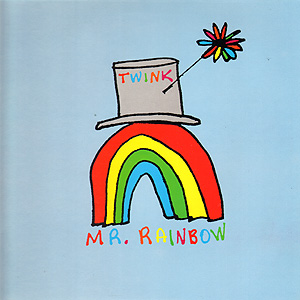 W.T.: Tα άλμπουμ σας Mr. Rainbow (1990) και Odds & Beginnings (1991) ουσιαστικά επανα-προσεγγίζουν και μάλιστα πολύ επιτυχημένα μερικά παλαιότερα κομμάτια σας. Σας ενδιαφέρει η εξέλιξη του παλαιότερου υλικού;
W.T.: Tα άλμπουμ σας Mr. Rainbow (1990) και Odds & Beginnings (1991) ουσιαστικά επανα-προσεγγίζουν και μάλιστα πολύ επιτυχημένα μερικά παλαιότερα κομμάτια σας. Σας ενδιαφέρει η εξέλιξη του παλαιότερου υλικού;
M.A.J.A.: Δεν με ενδιαφέρει πια η διασκευή παλαιότερου υλικού μου, αλλά επειδή υπάρχουν κομμάτια πολύ αγαπημένα στους ακροατές μου, δεν αποκλείω τις συναυλίες ρετρό ή αναλόγες ηχογραφήσεις.
W.T.: Στα μέσα της δεκαετίας του '90 κυκλοφορήσατε δύο λάιβ άλμπουμ με τον Nik Turner. Θα ήθελα να μας πείτε μερικά πράγματα γι' αυτή τη συνεργασία και επίσης αν παρακολουθείτε την τωρινή πορεία των Hawkwind.
M.A.J.A.: Η τουρνέ που έκανα στα 90s ως Pinkwind, ήταν πολύ διασκεδαστική και άρεσε στον κόσμο. Οι δύο ηχογραφήσεις από τα λάιβ, Festival Of The Sun (σε cd και βινύλιο) και Purple Haze (μόνο σε cd) βγήκαν σε περιορισμένο αριθμό αντίτυπων, 1000 κομμάτια σε όλα τα φορμάτ. Αυτά τα άλμπουμ πρόκειται να επανεκδοθούν σύντομα, μαζί με όλο το υλικό της Twink Records, θεού επιτρέποντος.
Δεν παρακολουθώ πια την πορεία των Hawkwind.
W.T.: Μετά ηχογραφήσατε τα άλμπουμ Pleasure Island (1996) και No Picture (1997) σε συνεργασία με τον Paul Rudolph, τα οποία ήταν και οι τελευταίες κυκλοφορίες της Twink Records.
M.A.J.A.: Με τον Paul Rudolph διασκεδάσαμε πάρα πολύ κατά την παραγωγή των ηχογραφήσεών μου, Pleasure Island και No Picture. Μετά από αυτά τα αλμπούμ, επειδή κάναμε και οι δύο καινούργιες σχέσεις, χάσαμε επαφή. Εγώ μάλιστα παντρεύτηκα τη δικιά μου και μετακομίσαμε στο Λος Άντζελες της Καλιφόρνιας.
W.T.: Μετά το 1997 τι κάνατε μουσικά;
M.A.J.A.: Το 1997 μετακόμισα στο Λος Άντζελες και δούλεψα με κάποια φοβερά γκρουπ, όπως οι The Brian Jonestown Massacre - συναυλίες, The Tyde - ηχογράφηση, The Quarter After - συναυλίες και ηχογράφηση, Smallstone - συναυλίες και ηχογράφηση, Backbitter - συναυλίες, The Streetwalking Cheetahs - συναυλίες και The Pink Fairies (LA) with Twink - δύο σπουδαία λάιβ που ηχογραφήθηκαν και θα κυκλοφορήσουν σύντομα, πρώτα ο θεός. Τα λάιβ έγιναν στο Λ.Α., στο Σαν Φρανσίσκο και το Σαν Ντιέγκο, σε παγκοσμίου φήμης κλαμπ, όπως είναι τα The Troubadour, Whiskey A Go Go, Spaceland, The Knitting Factory και The Purple Onion. Επίσης έκανα και μερικές προσωπικές εμφανίσεις στο Egyptian Theatre στη Hollywood Blvd, και παρακολούθησα και έπαιξα σε αρκετά τζαμαρίσματα. Ξεκίνησα μια μπάντα, τους Moonchild, ηχογράφησα κάποια ντέμο και έγραψα αρκετά καινούργια κομμάτια. Το 2002 επέστρεψα στη Βρετανία όπου συγκεντρώθηκα σε θέματα licensing.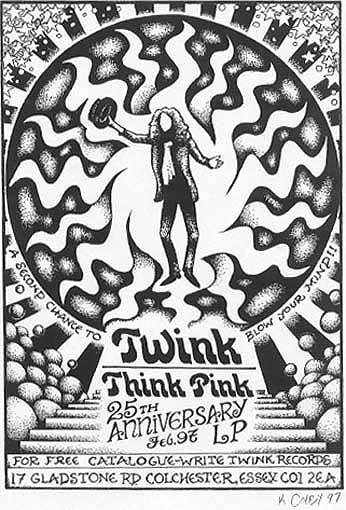 W.T.: Παράλληλα με την μουσική ασχοληθήκατε και με την ηθοποιία.
W.T.: Παράλληλα με την μουσική ασχοληθήκατε και με την ηθοποιία.
M.A.J.A.: Νομίζω ότι άρχισα από πολύ μικρός την καριέρα μου ως ηθοποιός, παίζοντας καουμπόηδες και ινδιάνους ή τους πειρατές. Έχω εμφανιστεί σε κάμποσες ταινίες όπως τα Smashing Time, What's Good For The Goose και Glastonbury Fayre και σε αγγλικές τηλεοπτικές σειρές όπως τα Lovejoy, 'Allo 'Allo, Only Fools And Horses, Vanity Fair, David Copperfield. Πολύ διασκεδαστική φάση, ειδικά το 'Allo 'Allo.
W.T.: Βλέποντας κανείς την μεγάλη μουσική σας πορεία διακρίνει το ιδιαίτερο ενδιαφέρον σας για τις συνεργασίες και τα τζαμαρίσματα. Είναι κάποια τζαμαρίσματα που έχουν μείνει πιο πολύ στη μνήμη σας;
M.A.J.A.: Μου αρέσουν τα τζαμαρίσματα που εξερευνούν άγνωστες μουσικές περιοχές. Βέβαια τα δύο jam session που είχα με τον Jimi Hendrix αποτελούν πολύ ιδιαίτερες αναμνήσεις. Το πρώτο ήταν στο UFO Club το 1967, και το δεύτερο στο The Speakeasy Club το 1970. Και τα δύο έγιναν στο Λονδίνο. Επίσης τζάμαρα με τον Jeff Beck στο Speakeasy, με τον Dane Stevens στη φωνή, τον John Freddy Gandy στο μπάσο, εμένα στα ντραμς και βέβαια τον Jeff Beck στην πρώτη κιθάρα. Παίξαμε μία ιλιγγιώδη ερμηνεία του "Jailhouse Rock" και έγινε χαμός. Άλλη μία φορά σε ένα θέατρο στο νότιο Λονδίνο με τους Jeff Beck, Ron Wood και Rod Stewart μου έχει μείνει επίσης αξέχαστη. Τα τζαμαρίσματα είναι η καλύτερη φάση!
W.T.: Τι μουσική ακούτε περισσότερο αυτή την εποχή;
M.A.J.A.: Αυτή την εποχή ακούω πολύ αραβική και μαροκινή (βερβέρικη) μουσική.
W.T.: Τι πιστεύτε ότι έχει αλλάξει στην προώθηση της μουσικής από τότε που άρχισε η ευρεία χρήση του ίντερνετ;
M.A.J.A.: Μου αρέσει αυτό που συμβαίνει στο ίντερνετ, σε ότι αφορά την προώθηση και προβολή «παράξενης» και νέας μουσικής. Άμα δεν είχαμε το ίντερνετ, θα είχε γίνει τόσο μεγάλο χιτ το "Crazy" των Gnarls Barkley; Η τεράστια επιτυχία αυτού του τραγουδιού οδήγησε σε ένα δεύτερο άλμπουμ, το The Odd Couple. Οι Gnarls Barkley σάμπλαραν το "Fluid" από το Think Pink και έφτιαξαν με αυτό ένα καινούργιο τραγούδι, το "Would Be Killer", που μπήκε σε αυτό το άλμπουμ και είναι για μένα πολύ πετυχημένο.
W.T.: Τώρα ετοιμάζετε κάτι; Ποια τα σχέδια σας;
M.A.J.A.: Μόλις τελείωσα να γράφω το Think Pink 2 και ψάχνω για δισκογραφική ή άλλη πηγή χρηματοδότησης για να το ηχογραφήσω. Τον Γενάρη θα πάω στη Ρώμη για να ηχογραφήσω ένα άλμπουμ με καινούργια κομμάτια, με τους Technicolour Dream. Εδώ στο Μαρακές έχω μπει στο στούντιο για να ηχογραφήσω φωνή και κρουστά μόνο, σε κάποια καινούργια κομμάτια. Επίσης σκέφτομαι να κάνω κάποια λάιβ μέσα στο 2013, θεού θέλοντος.
Ακολουθεί το κείμενο της συνέντευξης στα Αγγλικά:
John "Twink" Alder is one of the most important and original musicians in the history of rock music, in the UK and in general. He stands among the best and most influential drummers of the 60s and 70s, and has been a member of legendary groups such as The Fairies, Tomorrow, The Santa Barbara Machine Head (together with other greats like Jon Lord and Ron Wood), The Pretty Things and The Rings. He also founded the renowned Pink Fairies and co-founded the short-lived but significant Stars with Syd Barrett and Jack Monck. Always a restless soul with open musical horizons, he collaborated and jammed with dozens of musicians and groups (let us mention here Jimi Hendrix, Hawkwind and members of the Sex Pistols as indicative). Not only a central figure on the psychedelic scene of the 60s, he had also an energetic presence in the punk re-evaluation of all that rock took for granted, since among other things he was one of the inspirations for this movement. At the same time his personal recordings, like the amazing 'Think Pink' (1970) or the unjustly unappreciated 'Mr. Rainbow' (1990), are among the best examples of the rock idiom. About six years ago Mr. John Adler embraced Islam, changed his name to Mohammed Abdullah and lives with his family in Morocco. It is a great honor for us at Wild Thing to present the interview that follows.
Wild Thing: At what age did you become interested in music and what attracted you to the drums?
Mohammed Abdullah John Alder: I was interested in music as far back as I can remember at about five years old. I do have some earlier memories which do not include music.
I was playing guitar in a skiffle group called The Airliners when I was about 13 years of age and a chap came along who played guitar much better than me. I gave him my guitar to play in the group and I started playing the washboard for The Airliners which let me on to drums. Both the drummers Gene Krupa and Eric Delaney were both early influences.
W.T.: What kinds of music were your initial influences, both for drums and in general?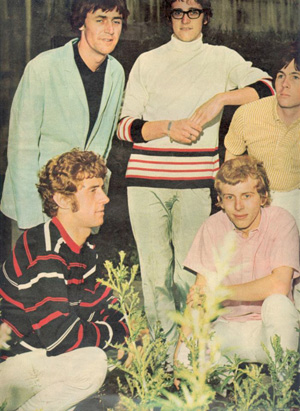 M.A.J.A.: I was interested in all types of music and then, when Rock n Roll Music began to spread that was the type of music I wanted to play. I began by playing in skiffle groups which was a cheap way to get started. When I bought my first drum kit when I was about 13, I joined a rock group called The Planets and our influences were Gene Vincent, Eddie Cochran, Buddy Holly and Little Richard. We didn't last long but then I played with Eddie Lee Cooper & The Trappers with the same influences which included Jerry Lee Lewis.
M.A.J.A.: I was interested in all types of music and then, when Rock n Roll Music began to spread that was the type of music I wanted to play. I began by playing in skiffle groups which was a cheap way to get started. When I bought my first drum kit when I was about 13, I joined a rock group called The Planets and our influences were Gene Vincent, Eddie Cochran, Buddy Holly and Little Richard. We didn't last long but then I played with Eddie Lee Cooper & The Trappers with the same influences which included Jerry Lee Lewis.
W.T.: Did you play with any other groups before the Fairies?
M.A.J.A.: Skiffle groups: The Airliners / The Angels / The Black Zillians. Rock groups: The Planets / Eddie Lee Cooper & The Trappers / Jimmy Pilgrim & The Strangers. R&B bands: Dane Stevens & The Deepbeats.
Here is a bit more info on what instrument I played in the early groups :
The Airliners - washboard & backing vocals. The Angels - rhythm guitar & lead vocals. The Black Zillians - drums. The Planets - drums. Eddie Lee Cooper & The Trappers - drums & lead vocals on "Brand New Cadillac". Jimmy Pilgrim & The Strangers - drums & lead vocals on "Shakin' All Over" & "Somewhere Over The Rainbow". Dane Stevens & The Deepbeats - drums & lead vocals on "My Babe". The Fairies - drums & lead vocals on "My Babe", "Hey Bo Diddley" & "I've Got To Get My Whiskey".
W.T.: What drew your generation, both musicians and audience, to "black" music?
M.A.J.A.: We were drawn to Black Music, The Blues, Folk Blues, Rhythm & Blues, Rock and Blues etc. because of the music itself and their messages & storytelling. We, the musicians, decided to emulate the great artists in those fields and pass on the message.
W.T.: The Fairies, from 1964, were one of the best British r&b groups of that period. Can you tell us something about them and why you broke up?
M.A.J.A.: Dane Stevens & The Deepbeats were very well known around Essex when I joined them. I was a 'mod' and I listened to a lot of kool music on the 'mod scene'. The Deepbeats were already playing R&B with a sax player and a rhythm guitarist that weren't too happy with me joining. The sax player & the guitarist left. The guitarist was replaced by the rhythm guitarist that I played with in The Black Zillians, Eddie Lee Cooper & The Trappers and Jimmy Pilgrim & The Strangers. John 'Akky' Accutt was his name. The line-up then was Dane Stevens - vocals, Mick Weaver - lead guitar, John Accutt - rhythm guitar, John Gandy - bass guitar & John Alder - drums. We became very popular with the input from the new musicians' desire to be a more 'authentic' R'n'B band. Eventually Decca Records found us and decided to record us. We recorded 5 tracks at Decca Studios, West Hampstead, London with Mike Leander producing. We decided to change our name and a friend of the group suggested 'The Fairies' and we liked it; so we became a fuzz r&b band called The Fairies. Decca released a single "Don't Think Twice It's Alright / Anytime At All". The single release brought us to live in London and lots of gigs. We started rehearsing a new single with Micky Most and then Dane Stevens had a serious car crash which involved some fatalities. Dane went to jail.
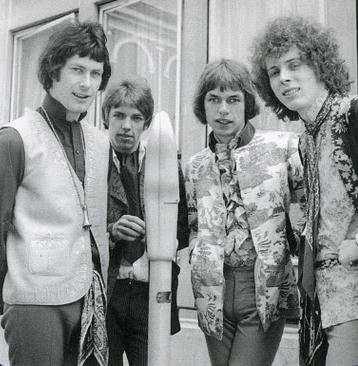 When we lost Dane, Nick Wymer from Nix Nomads came along and replaced him. Nick was a good replacement, however The Fairies were relegated to the second division and struggled to get back on top. We recorded two singles for EMI "Get Yourself Home / Baby Don't" and "Don't Mind / I'll Dance". We did the famous Thank Your Lucky Stars TV program for both singles. Things didn't really work out with Nick and eventually Dane Stevens returned to the group after serving a year in prison. The music scene was changing and momentum had been lost for The Fairies and we continued to struggle. One evening when The Fairies were playing a gig in London our friends from The In Crowd, Steve Howe & Keith West, showed up and asked me to join their group. I said yes and handed in my notice to The Fairies that night and started with The In Crowd the next day. The Fairies continued on for a short time after that with a new drummer but the dream was over and the band broke up.
When we lost Dane, Nick Wymer from Nix Nomads came along and replaced him. Nick was a good replacement, however The Fairies were relegated to the second division and struggled to get back on top. We recorded two singles for EMI "Get Yourself Home / Baby Don't" and "Don't Mind / I'll Dance". We did the famous Thank Your Lucky Stars TV program for both singles. Things didn't really work out with Nick and eventually Dane Stevens returned to the group after serving a year in prison. The music scene was changing and momentum had been lost for The Fairies and we continued to struggle. One evening when The Fairies were playing a gig in London our friends from The In Crowd, Steve Howe & Keith West, showed up and asked me to join their group. I said yes and handed in my notice to The Fairies that night and started with The In Crowd the next day. The Fairies continued on for a short time after that with a new drummer but the dream was over and the band broke up.
W.T.: How did you come to be called 'Twink'?
M.A.J.A.: When The Fairies began to tour in 1964/65 we visited Scotland often and built up quite a following. Our Scottish fan club used to send gifts to all members of the group to our London flat in Paddington. The gifts for me were packets of Twink Home Perm, which was a little joke because I had very wavy hair and of course never used a perm. The boys in the band started referring to me as Twink and the rest is history.
W.T.: In 1966 you joined the band The In Crowd, who later renamed themselves Tomorrow. During this period the sounds and experiences of the British music scene were changing direction. What brought that about?
M.A.J.A.: When I joined the In Crowd they were a soul band but that was about to change. The music scene was changing all over the world, mainly because of the use of drugs like hash/pot & psychedelic drugs like LSD, psilosibin etc. New clubs were opening up, new music appearing on disc, new writing in books & magazines, new looks & styles. We, The In Crowd, needed to get in to survive. We changed our name to Tomorrow, changed our image and musical style. The rest is history.
W.T.: Were you aware at the time of the american psychedelic scene in San Francisco, and what in your opinion were the similarities and differences with the British scene?
M.A.J.A.: At the time I thought there was a difference between US & UK new music but looking back there was no difference at all. I was listening to more American psychedelic music via The Electric Prunes, Jefferson Airplane, The Doors, Country Joe & The Fish. UK listening stuff was The Beatles, The Rolling Stones, The Yardbirds, The Moody Blues (Days of Future Passed). And as time went on, more & more of both US & UK music psychedelic music.
W.T.: In 1967, concurrently with Tomorrow you were a member of the Santa Barbara Machine Head, together with Jon Lord (R.I.P.), Kim Gardner and Ron Wood. Please tell us about this group.
M.A.J.A.: The Santa Barbara Machine Head was really a studio band and Jon Lord's brainchild. I shared a flat with John at the time Tomorrow was just beginning to take off. One day he invited me, Kim Gardner & Ron Wood into Decca Studios with him to record. Gus Dudgeon was producing & we recorded three tracks: "Rubber Monkey", "Albert" and "Porcupine Juice". We ran through the tracks quickly before recording them. It was just one session with no rehearsals and that was that. I don't know if Jon had any idea for putting a band together with us, maybe? But that session was a lot of fun!
W.T.: In his book White Bicycles-Making Music In The 60s Joe Boyd calls the band's performance of the song "Revolution" at the UFO Club "the apotheosis of the 60s UK underground". How would you describe the atmosphere at the UFO Club, at events like the 14 Hour Technicolor Dream and in London generally at that time?
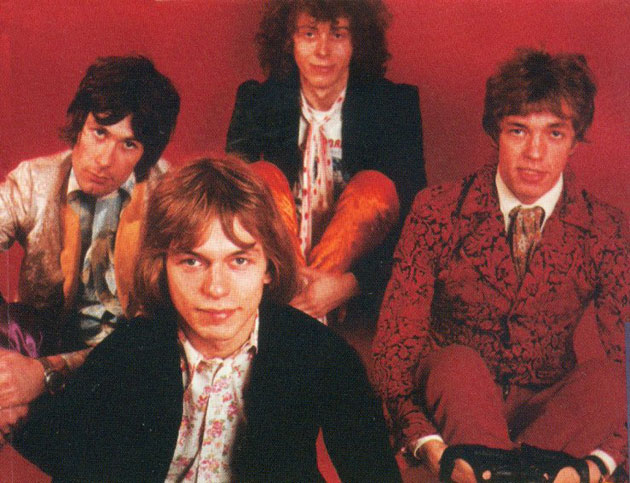 M.A.J.A.: 1966 & 1967 were particularly exciting times in the clubs of London & some other larger venues & festivals. The music was changing and people were changing. The UFO club in London was my first experience of a total psychedelic atmospheric scene. Liquid lights, incense burning, films being projected on wall space, actors & actresses acting out small plays, freak-out dancing & The Pink Floyd on stage. These ideas were then taken to The 14 Hour Technicolor Dream show at Alexandra Palace & Christmas On Earth etc. Although the larger gigs were incredibly interesting in their own way, UFO holds the candle for psychedelic atmospherics & great music.
M.A.J.A.: 1966 & 1967 were particularly exciting times in the clubs of London & some other larger venues & festivals. The music was changing and people were changing. The UFO club in London was my first experience of a total psychedelic atmospheric scene. Liquid lights, incense burning, films being projected on wall space, actors & actresses acting out small plays, freak-out dancing & The Pink Floyd on stage. These ideas were then taken to The 14 Hour Technicolor Dream show at Alexandra Palace & Christmas On Earth etc. Although the larger gigs were incredibly interesting in their own way, UFO holds the candle for psychedelic atmospherics & great music.
W.T.: You have stated that the song "My White Bicycle" was inspired by the dutch Provos. What contact did you have with the underground/alternative movements and bands, like the Deviants and MC5, in the UK and abroad and how do you view them today?
M.A.J.A.: It is true "My White Bicycle" was inspired by the Dutch provos' activities. However at that time we had no actual contact with the underground scene in the UK or Europe apart from our hash buying. It was not until we started playing at the UFO Club that we made contact with the underground and began to appreciate the movement. The Deviants didn't appear on my radar until 1969 and the MC5 1970. The MC5 are one of the greatest live rock'n'roll bands that I have ever seen.
W.T.: Tomorrow's album was financially successful and your gigs well attended. Why did you split up ?
M.A.J.A.: Tomorrow had already broken up by the time the LP was released and our gigs were always very exciting and well attended. The reason the group broke up was due to the success of Keith West / Mark Wirtz's "Excerpt From A Teenage Opera" and Keith found himself in a difficult position and made the wrong choices.
W.T.: Then you started the Aquarian Age, a band that left only one amazing single "10.000 words in a cardboard box ". Why did you not continue with this group?
M.A.J.A.: The Aquarian Age project ground to a halt because I joined The Pretty Things and doing gigs with them, recording S.F. Sorrow, the music for Whats Good For The Goose & Phillipe Des Barges and filming with Norman Wisdom took up all my time.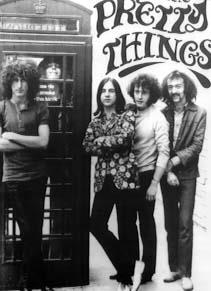 W.T.: How did you join The Pretty Things? What are your strongest memories from the S.F. Sorrow recording sessions?
W.T.: How did you join The Pretty Things? What are your strongest memories from the S.F. Sorrow recording sessions?
M.A.J.A.: During The Aquarian Age project I was approached by Dick Taylor to help out The Pretty Things because Skip (Alan) had left and my intention was to help out on the short-term but ended up staying with The Pretties for about 18 months. The Aquarian Age project continued for about two months but ground to a halt because my time was being taken up with a number of Pretty Things projects which included recording S.F. Sorrow. I really enjoyed working on S.F Sorrow and was happy to be back in Abbey Road where I had recorded the Tomorrow album and The Aquarian Age single. Working with the producer Norman Smith was particularly memorable; I found him to be very open to ideas and also very creative. Peter Mew, the engineer, was also great to work with.
It was very exciting for me to be working with The Pretty Things with whom I started out as a fan of the original line-up and then became a friend and then a participating member of the group. I already knew Dick & Phil (May) very well but got to know Jon (Povey) and Wally (Waller) while working with them, both of them are exceedingly talented musicians. The first time I heard "Bracelets Of Fingers", a track that Skip had recorded the drums on, blew me away. Recording the bass guitar and drums as the basic track for "Balloon Burning" was particularly memorable, very tight and intense performance from Wally & me.
W.T.: What prompted your departure from the Pretty Things?
M.A.J.A.: I had other ideas developing about music & music direction which conflicted with The Pretties' ideas and this led to conflict. There was never any violent confrontation which has been reported however I was eventually fired from The Pretty Things for behavior unbecoming a Rock Star hhhhh.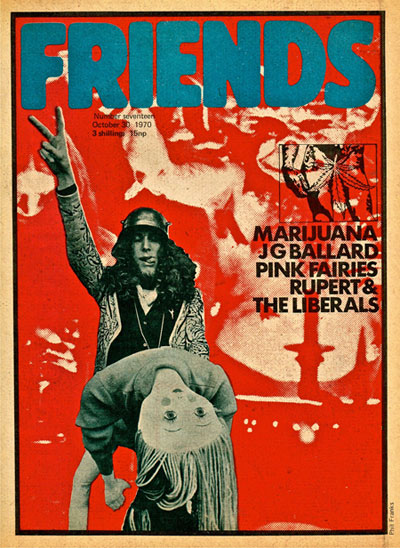 W.T.: Immediately after this, you recorded Think Pink, a great solo album despite being your first!
W.T.: Immediately after this, you recorded Think Pink, a great solo album despite being your first!
M.A.J.A.: As I have already pointed I was still with The Pretty Things when I recorded Think Pink which I don't think Phil and The Pretties management were too happy about. It was great fun recording all the tracks surrounded by and aided by all my mates at the time. Most of the tracks I had already made demos of
and "The Sparrow Is A Sign", "3 Little Piggies" were put together in the studio. "Ten Thousand Words In A Cardboard Box" had already been released by The Aquarian Age. Another Aquarian Age song "Tiptoe On The Highest Hill" was demo'd at EMI Studios at Manchester Square in early 1968. "Suicide", the first real song that I wrote in 1966, was demo'd at that time in my home studio. There were outstanding performances on the recordings from everyone, in particular Paul Rudolph, Jon Povey, John Wood and Steve Peregrin Took. It is worth a mention that the final mix was done by Steve Peregrin Took and myself with Richard Gottereh present. Richard was Seymour Stein's partner in Sire Records.
W.T.: You have stated that Think Pink is the first Pink Fairies album, did the group come together as a result of the recordings?
M.A.J.A.: Yes I have said in the past that Think Pink was the first Pink Fairies album but I don't believe that today, but only to a certain degree. Certainly Steve Peregrin Took & I had a imaginary band called 'The Pink Fairies', with our Pink Fairy velvet jackets, which we were working towards but that only became a reality when I had left The Pretty Things and he left Tyrannosaurus Rex. After playing drums on The Carnivorous Circus I formed The Pink Fairies with Paul Rudolph, Duncan Sanderson & Russell Hunter. Long Live Rock'n'Roll.
W.T.: The Lost Experimental Recordings, made in 1970, were released much later than their recording. What lead to the creation of this material?
M.A.J.A.: The Lost Experimental Recordings 1970 were random ideas and sketches for future recording projects. "You Have Been Chosen" was demo'd in 1968 when I lived in Egerton Gardens, Knightsbridge. The Psychedelic Electrician recordings were the sound-track for a one man stage play called The Psychedelic Electrician which was never performed.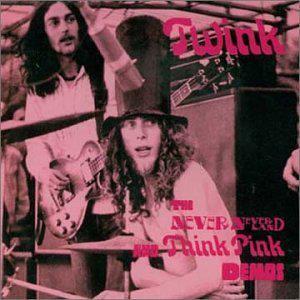 W.T.: The Pink Fairies, being one of the best and most influential groups of the early 70s, had it's own philosophy. Can you tell us about it and also about the album Never Never Land and the song "Do It"?
W.T.: The Pink Fairies, being one of the best and most influential groups of the early 70s, had it's own philosophy. Can you tell us about it and also about the album Never Never Land and the song "Do It"?
M.A.J.A.: The following is the sleeve notes for the release of the album Do It by The Pink Fairies on Bomp Records (Total Energy label CD & vinyl). It clearly sums up our attitude / philosophy at the time:
"In 1969 my world collided with the likes of Paul Rudolph, Duncan Sanderson & Russell Hunter, and for the next two years we felt like we could inherit the earth. Pretty large aspirations for four hippies from Ladbroke Grove. Remember, this was the dawn of stadium rock, with bands like Led Zeppelin rearing its ugly head. The era of rock gods, inflated ticket prices, and total inaccessability for fans. We wanted to tear it all down. Pick by pick. The thought of our fans paying to see us was incomprehensible. We played only for free, after all money was the root of all evil, right? We waved two fingers at corporate rock by setting up & playing outside of huge rock events. Why pay? We'll give it to you for free. We bewitched people from the entry gates at the Isle of Wight & Bath. We got naked at Phun City, played benefits for the underground press, rocked a gay pride rally, and helped organize the very first Glastonbury Festival. We shamelessly promoted ourselves by spray painting our name on the sides of express coaches that crossed country. We influenced everyone from Hawkwind to the Sex Pistols. We were the people's band. Long live rock'n'roll. TWINK 1998"
 The song "Do It" was written on the way to the recording studio after having just received a letter from BAG Productions telling us that John & Yoko were too busy to write a song for The Pink Fairies. I wrote the lyrics in less than five minutes. The music too was easy for me and when I reached the studio I explained to Paul , ".... it goes like this ..." and then I imitated the guitar sounds to him vocally which he transcribed to the guitar.
The song "Do It" was written on the way to the recording studio after having just received a letter from BAG Productions telling us that John & Yoko were too busy to write a song for The Pink Fairies. I wrote the lyrics in less than five minutes. The music too was easy for me and when I reached the studio I explained to Paul , ".... it goes like this ..." and then I imitated the guitar sounds to him vocally which he transcribed to the guitar.
Never Never Land by The Pink Fairies holds many secrets from the cover to the concept of the album itself. InshAllah, one day all will be revealed. It was fun recording in a brand new studio in Piccadilly, London. We did struggle in the beginning with a Polydor appointed producer Neil Slaven, however we took over the production eventually and finished the album. We tried to squeeze as much music onto the album as possible but we went a little bit too far which impacted the size of the grooves, they were too small/narrow, and therefore for maximum volume you needed to turn it up to 11 or more. The concept & design of the album sleeve was mine and I directed the artist Pennie Smith. Her finished artwork was very cool! My personal favorite track on Never Never Land is "War Girl", music by Sanderson, Hunter, Rudolph & lyrics John 'Twink' Alder.
W.T.: Subsequently what made you leave the group?
M.A.J.A.: I left The Pink Fairies because I was suffering from "Paranoid Schizophrenia", and I was very ill but I didn't know it at the time. It took me many years to recover but here I am alhumdulillah!
W.T.: In the late 60s the rock community turned from psychedelics to hard drugs. How did this effect the music?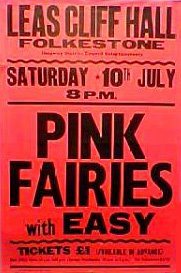 M.A.J.A.: The sad thing about the move to hard drugs is that we lost some great musicians and the whole vibe changed, particularly in the UK. I personally believed at the time, in 1967, that we could change the world for better through psychedelic music's message and the hippie movement. Harder drugs like alcohol, smack, speed, cocaine etc. are selfish drugs. Psychedelics, pot & hash, are sharing drugs. Music was effected and it became "harder" but some kept the faith and continued to produce outstanding records and today we see a great revival and interest in The Golden Age of Music.
M.A.J.A.: The sad thing about the move to hard drugs is that we lost some great musicians and the whole vibe changed, particularly in the UK. I personally believed at the time, in 1967, that we could change the world for better through psychedelic music's message and the hippie movement. Harder drugs like alcohol, smack, speed, cocaine etc. are selfish drugs. Psychedelics, pot & hash, are sharing drugs. Music was effected and it became "harder" but some kept the faith and continued to produce outstanding records and today we see a great revival and interest in The Golden Age of Music.
W.T.: In 1972, together with Syd Barrett and Jack Monck, you created the Stars. Did you know Syd Barrett well before this and what was it like to work with him? Does any recorded material from the Stars exist?
M.A.J.A.: In 1972 I formed Stars with Syd Barrett and Jack Monck. I had known Syd since 1967 when we played a lot of shows together, Alexandra Palace, The Saville Theatre & The Roundhouse etc., but it wasn't until Stars that we became friends. It was a real pleasure working with Syd in Stars, the atmosphere was very relaxed with no pressure from anyone. We practiced in Syd's basement & the back-room at "Whats In A Name", a boutique in Union Road, Cambridge. There is a recording of Stars on YouTube which has been mis-labelled 'Barrett, Gilmour & Shirley 1970'; it is in fact 'Stars, Barrett, Alder and Monck 1972'. That's it as far as Stars recordings that have survived, as far as I know.
W.T.: We know that Syd Barrett's last live performance was with the Stars in Cambridge, and that the subsequent negative review of the performance in the music press was a catalyst in his withdrawal. What really happened at that gig and was the reason the Stars split?
M.A.J.A.: The first show a Cambridge Corn Exchange was riddled with problems. The PA system was faulty and there was no back line. Syd cut his finger while playing which slowed him down. We had inexperienced road crew who were unable to deal with problems as they occurred. For Stars and the audience it was a poor gig! We played a second gig at Cambridge Corn Exchange a few days later, which was much better all round. Unfortunately the first gig was negatively reviewed in a high profile music magazine. The day after the publication Syd came over to my cottage in Union Road and he said he wasn't going to play any more. Very disappointing because Stars was a good band.
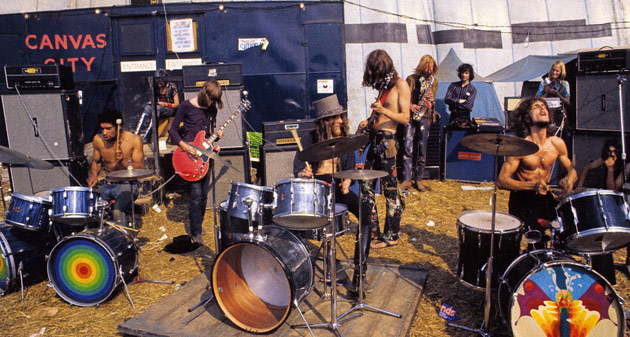
W.T.: After the Stars you played with Hawkwind for a while. We would like to know about this collaboration and also about the legendary jam sessions they had with the Pink Fairies.
M.A.J.A.: While living in Cambridge after leaving The Pink Fairies I received a few phone calls from Hawkwind to help them out because Terry Ollis was unwell, which I did. I did a little bit of recording with Hawkwind; for example I am on backing vocals on the hit single "Silver Machine", I play drums on Live At The Kenetic Playground, and percussion on the early Captain Lockheed & The Starfighters recordings.
Pinkwind started as joint promotions and developped into jam sessions at the end of gigs which were always pretty wild. Pinkwind became a band in its own right in the 90s always featuring Nik Turner and me and released two limited edition albums, Festival Of The Sun and Purple Haze. There may well be some Pinkwind gigs in 2013!!!
W.T.: In 1977 you sang with the punk group The Rings, in gigs and on their recordings. What did the punk movement mean to you, both musically and socially?
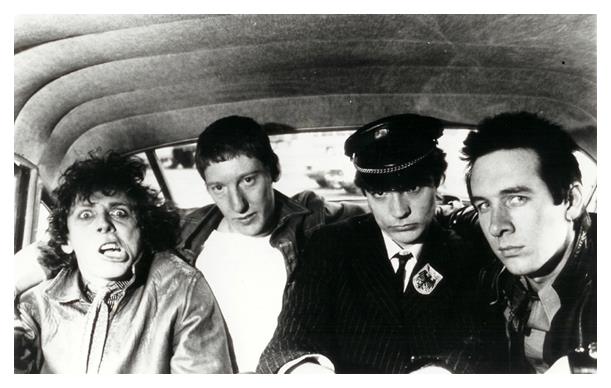 M.A.J.A.: I was enthused when Punk Rock hit the scene. It was good to see the young ones grabbing and owning rock'n'roll for themselves. The UK music had become rather stale with our top musicians finding their feet in the States making loads of money and settling there. The Rings Live At The 100 Club 1977 has just been released on Whiplash Records. Socially, I was hanging out with The Pistols, The Damned, Johnny Thunders & The Heartbreakers, Chryssie Hynde, all big fans of The Pink Fairies.
M.A.J.A.: I was enthused when Punk Rock hit the scene. It was good to see the young ones grabbing and owning rock'n'roll for themselves. The UK music had become rather stale with our top musicians finding their feet in the States making loads of money and settling there. The Rings Live At The 100 Club 1977 has just been released on Whiplash Records. Socially, I was hanging out with The Pistols, The Damned, Johnny Thunders & The Heartbreakers, Chryssie Hynde, all big fans of The Pink Fairies.
W.T.: The next year you released the EP Do It '77. Tell us about this release and the term "Acid Punk".
M.A.J.A.: When The Rings finally broke up after playing the Mont de Marson Festival in the South of France Chiswick Records suggested I do another single. Originally the song I wrote for the single was called "Acid Punk"; this title was taken from The Rings fanzine which Alan Lee Shaw put together. Although "Acid Punk" was a great title, it didn't work with the song so I changed the title to "(The) Psychedelic Punkeroo". The first time I practiced the song with a full band it sounded great, Steve Jones on lead guitar, Paul Cook on drums and Kid Rogers on bass guitar with me on vocals at The Professionals practice rooms. I recorded "Psychedelic Punkeroo" and "Enter The Diamonds" and during the last recording session The Lightning Raiders paid a visit to the recording studio and we did a one take jam on "Do It" - Little John Hodge on lead guitar, Duncan Sanderson on bass guitar and Kid Rodgers on rhythm guitar with me on drums and lead vocals. Chiswick Records loved "Do It" and decided to put out a 12" single with "Do It '77" as the featured track. It was released as Twink and The Fairies in early 1978 but recorded in 1977.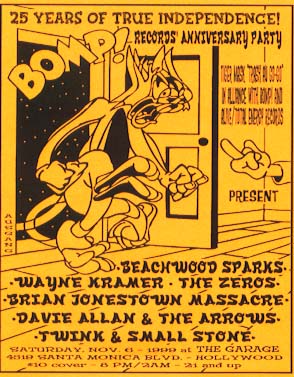 W.T.: What did you do after that and how did Twink Records come about ? What was it like for you, as musician, to have your own record label?
W.T.: What did you do after that and how did Twink Records come about ? What was it like for you, as musician, to have your own record label?
M.A.J.A.: After the success of "Do It '77" I decided to take a break and I moved to Brussells, Belgium with my wife Marie who was from Brussells & my then 2 year old son Frederick. While there I recorded an album called Victim Of Time playing drums for Elton Motello. I stayed in Belgium for about 5 years and then moved back to the UK and lived in Swindon, Wiltshire where I joined a local band called This World who became Jazz. We did a few gigs including Dingwalls in London but when I moved back to my home town Colchester, Essex I left the band. While in Colchester I decided to start my own record label Twink Records which was very hard in the beginning starting out with very little money. My idea for the label was to promote John Twink Alder the musician and to help new musicians. I found it particularly hard having to deal with distributors in the beginning with the release of the "Apocalipstic" 7" single, "Space Lover" 12" single & Mr.Rainbow LP & CD, so I bought a little red van and became TWK Distribution too! At that point it all started to come together.
W.T.: In the late 80s you played on the live album of Plasticland You Need A Fairy Godmother . What led to this participation and what is your opinion on the psychedelic revival scene of the 80s?
M.A.J.A.: In 1987 I participated in a Pink Fairies re-union tour. At the Acid Daze festival in Finsbury Park, John Frankovic from Plasticland was there and he invited me to collaborate with Plasticland on a project. Over the next few months we arranged some shows in the US and two recording projects for the collaboration. A live LP for Midnight Records and a single for a German label. The live album was called You Need A Fairy Godmother and the German single was never released. I was surprised to see the psychedelic revival taking place in the 80s which continues to grow to this day.
W.T.: In 1990, together with The Bevis Frond, you released Magic Eye, one of the best albums of that year. What can you tell us something about this collaboration?
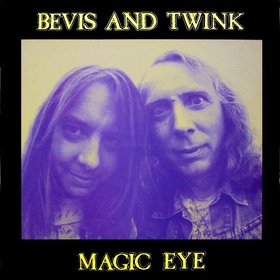 M.A.J.A.: In 1990 was the release of Magic Eye by Bevis and Twink. Myself and Bevis went into the same studio where I recorded Mr. Rainbow and some of the tracks on Odds & Beginnings. We spent one day in the studio recording and one day mixing. The album was released on vinyl only. It was great working with 'Bevis' whom I found to be very professional, a great lyricist and a talented musician.
M.A.J.A.: In 1990 was the release of Magic Eye by Bevis and Twink. Myself and Bevis went into the same studio where I recorded Mr. Rainbow and some of the tracks on Odds & Beginnings. We spent one day in the studio recording and one day mixing. The album was released on vinyl only. It was great working with 'Bevis' whom I found to be very professional, a great lyricist and a talented musician.
W.T.: Both your later albums Mr Rainbow (1990) and Odds & Beginnings (1997) basically revisited, and very successfully too, your older material. Are you interested in revising and developing older material?
M.A.J.A.: I am not that interested today in revising older material however there are some songs that the fans love and for that reason I don't rule out doing retro shows or recordings.
W.T.: In the mid 90's you issued two live albums with Nick Turner, can you tell us about this collaboration and do you follow Hawkwind's current progress ?
M.A.J.A.: Pinkwind in the 90's was great fun and the fans loved the shows. The two recordings Festival Of The Sun (CD & Vinyl) and Purple Haze (CD) were limited editions of 1000 copies in all formats. To be re-issued along with all Twink Records releases soon inshAllah. I do not follow Hawkwinds progress these days.
W.T.: Twink Record's last two releases were the albums Pleasure Island (1996) and No Picture (1997), which you made with Paul Rudolph.
M.A.J.A.: My recordings with Paul Rudolph entitled Pleasure Island and No Picture were enormous fun to produce. We lost touch after those two albums because we both had new girlfriends. In fact I married mine and moved to Los Angeles, California and stayed there for five years.
W.T.: What have been your musical activities since 1997?
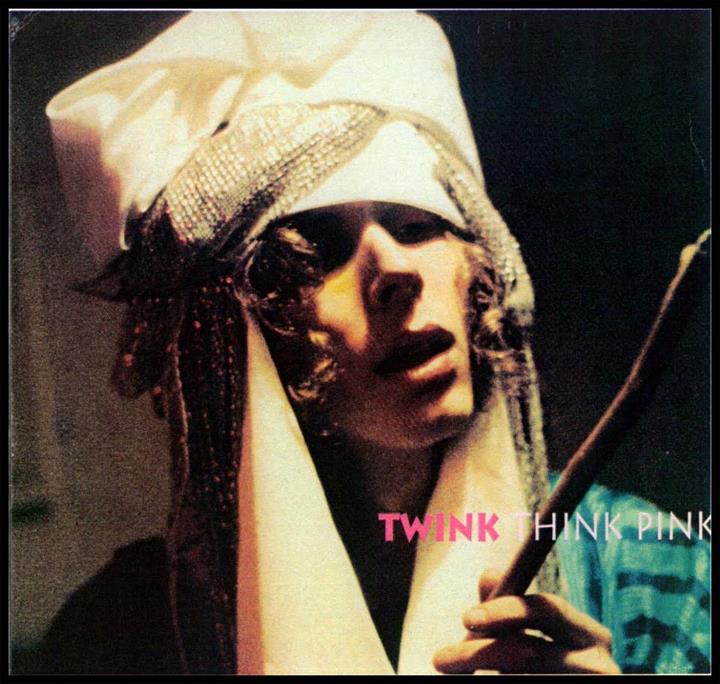 M.A.J.A.: In 1997 I moved to Los Angeles and worked with some great bands, The Brian Jonestown Massacre - guested on live shows, The Tyde - recorded, The Quarter After - live shows & recording, Smallstone - live shows & recording, Backbiter - guested live shows, The Streetwalkin Cheetahs - guested live shows & The Pink Fairies (LA) featuring Twink - two great live shows that were recorded and are soon to be released inshAllah. The shows were all in LA, San Francisco & San Diego at some of the world famous venues like The Troubadour, Whiskey A GoGo, Spaceland, The Knitting Factory and The Purple Onion. I also made some personal appearances at The Egyptian Theatre on Hollywood Blvd. and attended and played at quite a few jam sessions. I started a band called Moonchild and recorded some demos and wrote quite a lot of new songs. I returned to the UK in 2002 and concentrated on licensing projects.
M.A.J.A.: In 1997 I moved to Los Angeles and worked with some great bands, The Brian Jonestown Massacre - guested on live shows, The Tyde - recorded, The Quarter After - live shows & recording, Smallstone - live shows & recording, Backbiter - guested live shows, The Streetwalkin Cheetahs - guested live shows & The Pink Fairies (LA) featuring Twink - two great live shows that were recorded and are soon to be released inshAllah. The shows were all in LA, San Francisco & San Diego at some of the world famous venues like The Troubadour, Whiskey A GoGo, Spaceland, The Knitting Factory and The Purple Onion. I also made some personal appearances at The Egyptian Theatre on Hollywood Blvd. and attended and played at quite a few jam sessions. I started a band called Moonchild and recorded some demos and wrote quite a lot of new songs. I returned to the UK in 2002 and concentrated on licensing projects.
W.T.: Alongside music, you have also enjoyed an acting career. How did it start and what was it like?
M.A.J.A.: I think I started my acting career when I was very young playing either cowboys & indians or pirates. I have appeared in a couple of films: Smashing Time, What's Good For The Goose, Glastonbury Fayre and also a number TV series in the UK like Lovejoy, Allo Allo, Only Fools & Horses, Vanity Fair, David Copperfield and others. Great fun, especially Allo Allo!
W.T.: During the whole of your long career in music we see a marked interest in, even a knack for, successful collaborations and jamming sessions. What can you tell us on this subject? Which jam sessions stand out in your memory?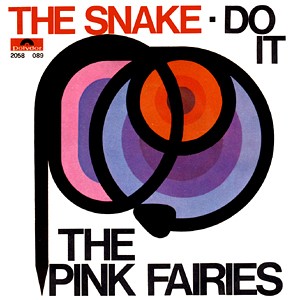 M.A.J.A.: I like jamming which explores new musical territories. Of course the two jams I had with Jimi Hendrix are very special memories. Once at UFO Club 1967 and once at The Speakesy Club 1970, both in London. Jamming with Jeff Beck at The Speakeasy with Dane Stevens on vocals, John Freddy Gandy on bass guitar and me on drums and of course Jeff Beck on lead guitar. We did a blistering rendition of "Jailhouse Rock" and brought the house down. Another time with Jeff Beck, Ron Wood, Rod Stewart and me was particularly memorable at a theatre in South London. Jamming is where it's at!!!
M.A.J.A.: I like jamming which explores new musical territories. Of course the two jams I had with Jimi Hendrix are very special memories. Once at UFO Club 1967 and once at The Speakesy Club 1970, both in London. Jamming with Jeff Beck at The Speakeasy with Dane Stevens on vocals, John Freddy Gandy on bass guitar and me on drums and of course Jeff Beck on lead guitar. We did a blistering rendition of "Jailhouse Rock" and brought the house down. Another time with Jeff Beck, Ron Wood, Rod Stewart and me was particularly memorable at a theatre in South London. Jamming is where it's at!!!
W.T.: What kind of music are you listening to these days ?
M.A.J.A.: I am listening to a lot of Arabic & Moroccan (Berber) music at present.
W.T.: What do you believe has changed in music promotion since the beginning of wide spread use of the internet? Do you think it really helps the musicians and music in general?
M.A.J.A.: I like what is happening on the internet with regard to promotion and exposure for obscure and new music. If we didn't have the internet would "Crazy" by Gnarls Barkley have been such a big hit? The enormous success of this song led to a second album called The Odd Couple and Gnarls Barkley sampled "Fluid" from Think Pink and created a new song called "Would Be Killer", which was on that album and it was very successful for me.
W.T.: What are your future plans and are you currently preparing any material?
M.A.J.A.: I have just finished writing Think Pink 2 and I'm looking for a record company or finance to record. In Jan 2013 I am going to Rome to record an album with Technicolour Dream of some new songs. I have been in the studio here in Marrakech where I've been recording only vocals & percussion on some new songs. I am looking to do some shows in 2013 inshAllah.
W.T.: Mr. John thank you very much for the interview. It's a great honour for us having you at Wild Thing.
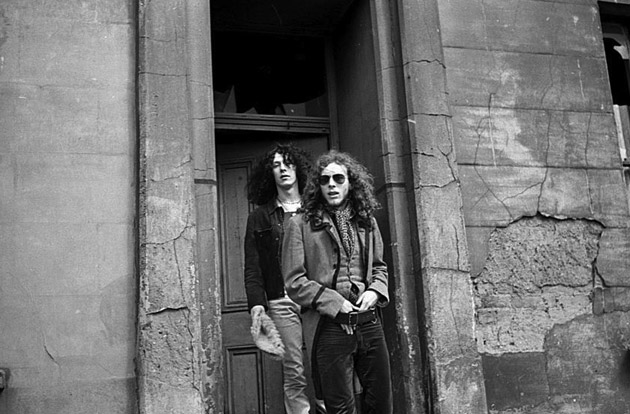
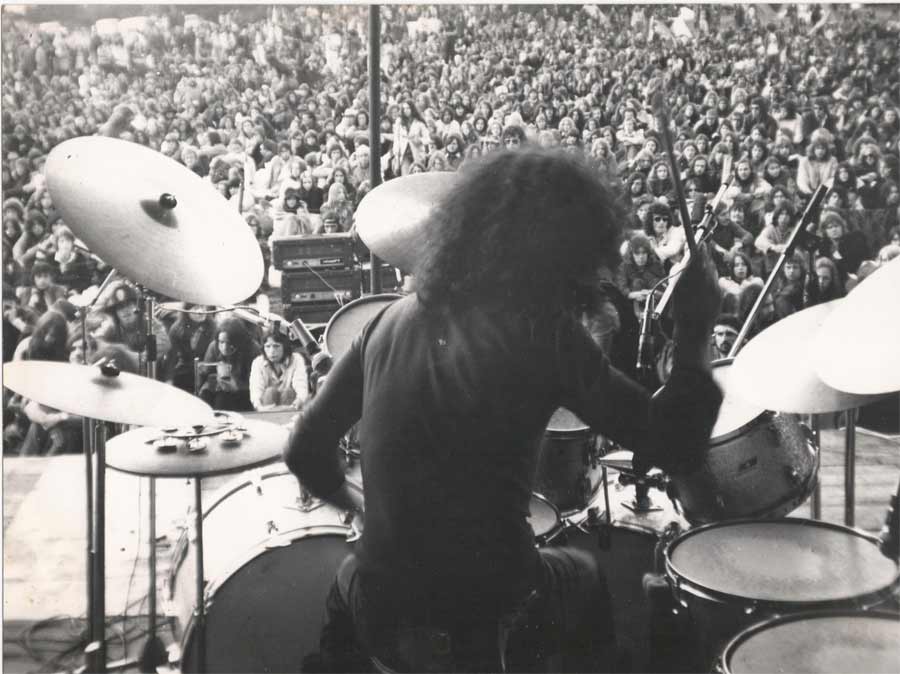
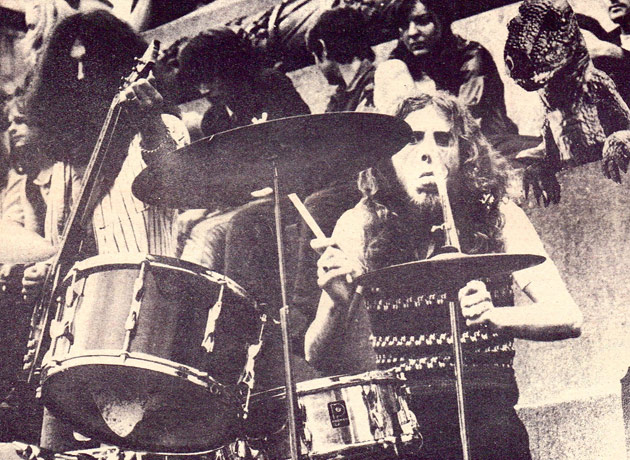
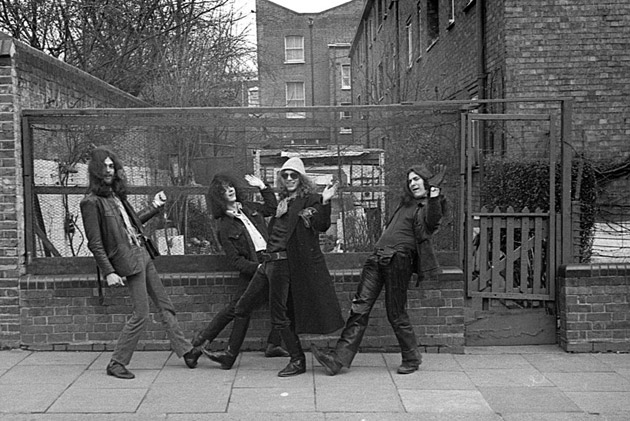
John Alder's best ever Top Twenty Albums:
01. Syd Barrett - The Madcap Laughs
02. Love - Forever Changes
03. The Byrds - Younger Than Yesterday
04. The Steve Miller Band - Sailor
05. The Beatles - Revolver
06. The Beatles - Sgt. Peppers Lonely Hearts Club Band
07. The Electric Prunes - I Had Too Much To Dream Last Night
08. The Moody Blues - In Search Of The Lost Chord
09. The Rolling Stones -Their Satanic Majesties Request
10. The Pink Floyd - The Piper At The Gates Of Dawn
11. Bob Dylan - Blonde On Blonde
12. George Harrison - All Things Must Pass
13. Jefferson Airplane - Surrealistic Pillow
14. The Doors - The Doors
15. Miles Davis - Sketches Of Spain
16. Rufus Thomas - Walking The Dog
17. Jimmy Reed - Just Jimmy Reed
18. Marvin Gaye - What's Going On
19. Bo Diddley - Bo Diddley
20. Little Walter - My Babe
(All in no particular order)
Tags: Mohammed Abdullah John Alder, Twink, The Fairies, Tomorrow, The Pretty Things, Pink Fairies, Pinkwind, The Rings, Stars, Syd Barrett, Bevis & Twink, psychedelic rock, interview
From 1998 to 2012...
Some personal favourites!!
BLUE CHEER - What Doesn't Kill You (2007)
BUDDY GUY - Skin Deep (2008)
BUDDY MILES - Blues Burries (2002)
CHRIS DUARTE GROUP - Blue Velocity (2007)
COLOUR HAZE - Colour Haze (2004)
CORROSION OF CONFORMITY - America's Volume Dealer (2000)
FU MANCHU - California Crossing (2001)
GARY CLARK JR. - The Bright Lights E.P. (2011)
GEORGE THOROGOOD & THE DESTROYERS - 2120 South Michigan Avenue (2011)
GUITAR SHORTY - We The People (2006)
JAMES BLOOD ULMER - Birthright (2005)
JIMMIE VAUGHAN - Plays Blues, Ballads & Favorites (2010)
LESLIE WEST - Unusual Suspects (2011)
MONSTER MAGNET - Powertrip (1998)
OZRIC TENTACLES - Live At The Pongmaster's Ball (2002)
PORCUPINE TREE - Fear Of A Blank Planet (2007)
QUEENS OF THE STONE AGE - Rated R (2000)
REIGNING SOUND - Too Much Guitar (2004)
R.L. BURNSIDE - Well Well Well (2001)
ROBERT RANDOLPH & THE FAMILY BAND - Live At The Wetlands (2002)
ROKY ERICKSON - True Love Cast Out All Evil (2010)
THE BLACK KEYS - The Big Come Up (2002)
THE BRIAN JONESTOWN MASSACRE - Bravery, Repetition & Noise (2001)
THE CLUTCH - Blast Tyrant (2004)
THE FUZZTONES - Salt For Zombies (2003)
THE HELLACOPTERS - By The Grace Of God (2002)
THE SUPERSUCKERS - Live At The Magic Bag, Ferndale, Michigan (2004)
TOOL - Lateralus (2001)
WOLFMOTHER - Wolfmother (2005)
(Άκης Γαρράς / in the meantime...)
